#I love this analysis
Text
I want to talk about why I think this is the one of the most important Falin panels:

So, Falin is really nice, right? It's one of the first things we really learn about her. She's kind even to the monsters of the dungeon - choosing to ward the party rather than fight spirits and cause them needless harm.

In the above early flashback in chapter 11, we see Marcille fawning over Falin's kindness, calling her an angel. Namari calls her soft-hearted. We see Falin choose not to fight even when a zombie attacks - instead she resolves the confrontation with a hug. After the flashback, the first thing Senshi says is that Falin "sounds like quite the person," which Marcille strongly affirms.
At this point in the story, all we have seen of Falin are these impressions; she is a healer, an angel, a caretaker with an infinite well of kindness towards everyone she meets - both friend and foe.
And honestly, that remains most of what we have to go by to understand her. The only times we get to see Falin on the page, alive and just herself, are in the opening and closing pages of the story and in the brief period of time after she is resurrected.
Nonetheless, we do have some more details to work with. For one, there is the scene that The Panel is from - a short memory in chapter 75, when Marcille flashes back to while she's dying. In that scene, Falin prepares to teleport them all out, and says that she's sorry "if there is a person at [their] destination." And that's when we get The Panel.
If you teleport someone or something into another person, the person teleported into is likely to be, at minimum, severely injured. They could die.
We can see a lovely little horrifying example of exactly why in one of the Daydream Hour doodles:
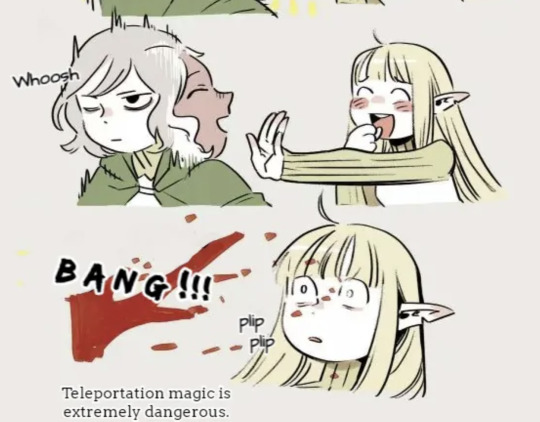
So, hmm. That's not... that's not SUPER nice. Certainly not displaying the same "kindness to all, friend and foe included" we saw represented earlier. On a basic level, this adds some nuance to Falin's kindness. We see it break a little, when pushed to the limit. We see her chose to protect the people she loves above all else.
Which makes sense! As Laios says when the Winged Lion accuses him of similarly being motivated more by his friends' safety than everyone else in the dungeon, "...most people, aside from virtuous do-gooders, would feel the same way."
So, we can take The Panel as simply showing a moment of weakness for Falin. A time when she was pushed to her limits, and that "most people" selfish side of her shone through.
However... I think there's a little more going on with Falin than just her being an angel 99% of the time, except just that once. I love The Panel because I think it helps us understand that Falin isn't just motivated by kindness - she also has a desire to avoid seeing people in pain.
Isn't that the same thing?
No, no it very much is not.
Let's look at a short comic from the Falin section of the Adventurer's Bible, because I think it illustrates this point perfectly. The group is complaining about how much Marcille's healing hurts, and comparing it to Falin's, which "doesn't hurt a bit." Marcille retorts with the following:

Now, the punchline of this comic is that, despite Marcille's sentimental assertion that she's "thinking of [them]" by letting her healing magic hurt, they all still prefer to be healed by Falin.
But hey, this wouldn't be the first time that Dungeon Meshi hides a very real character beat or insight in a gag, so let's think about this somewhat seriously.
If Marcille is right (and she knows a fair bit about magic, so we can assume that she has at least somewhat of a point), then what Falin is doing isn't kind. I suppose if someone specifically requested to not feel the pain, it could be kind, but that's not really what happened here. She is the one who felt badly about the others being in pain, and she is the one who decided, without telling them or giving them a choice in the matter, to take away that pain.
Both Marcille and Falin are healing the party, but Marcille is doing it in a way that accomplishes the task in the most straight forward way, without any additional interference. Falin is going out of her way to perform the healing in a way she is more comfortable with. A way that avoids pain.
Going back the The Panel, I don't think its a coincidence that the only time we see Falin (well, non-chimera Falin) willing to do something that could hurt someone is when any potential pain will be far away from her. If she got someone hurt or killed by teleporting the party to the surface? Not only would it be far out of her sight, but she'd be dead before she had to deal with any consequences of that action.
Falin is not a confrontational person. She doesn't push when Marcille won't tell her the truth about the resurrection, and she comforts Laios about her own death - both of those things happening in the only full chapter she is alive and conscious in the whole story.
We also know that she considered accepting Shuro's proposal, despite not having any special feelings towards him, and that Falin never explained to Marcille that she wanted them to share a meal together. When she brought Marcille various foods at the academy, she just accepted Marcille's confused rejection and gave up.
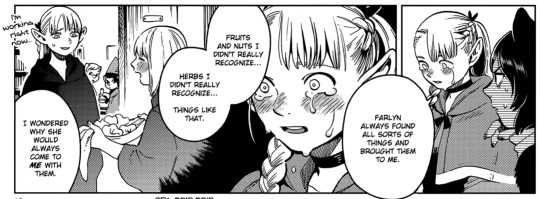
And lastly, we know that she is still in contact with her parents, despite the neglect and abuse she suffered at their hands. Although the way someone chooses to handle contact with abusive or bad family is a complicated topic, which I don't want to overly simplify, I do I think this fact gets at the heart of how she handles conflict.
So many people that Falin loves have hurt her. There are understandable hurts, like Laios leaving the village, or Marcille not understanding the food. And there are bigger, far less justifiable hurts - like her parents neglecting her throughout her childhood, and sending her away to be alone at the magic academy.
It doesn't seem like Falin has ever confronted any of it directly.
And the unhealthy aspects of this kind of avoidance of pain and confrontation is one of the things that the story of Dungeon Meshi is all about. We see Laios grapple with it before he goes to kill Falin, and we see Marcille acknowledge it at the end of the story, when she tells Laios that she has come to terms with Falin's death:
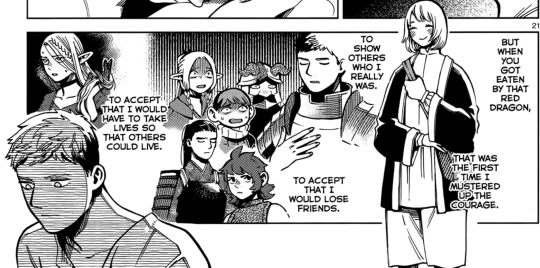

Eating is a part of life. Consuming other living things is a part of life. It isn't really possible to avoid that pain - you can only hide from the truth of it. You have to be selfish everyday. You have to eat - to choose to live. To choose to take up space.
And this is something Falin embraces, too. She comes back to life, after all.
We see her choose to come back to life.
And how does she make that choice? She eats. She consumes, and then she is asked a question by the manifestation of hunger itself:
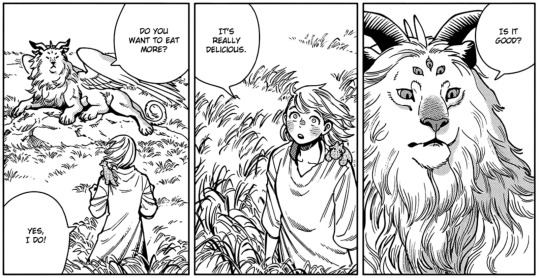
Do you want to eat more?
There is a double meaning in the Winged Lion's final words on the next page.
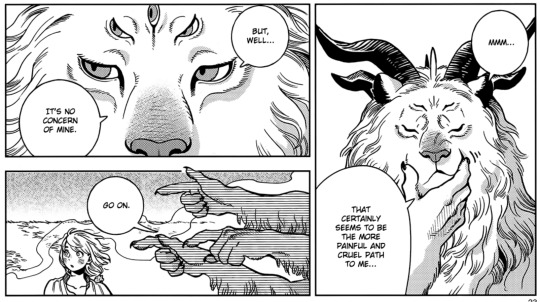
When I first read this, I took it as him saying: life is cruel. You will suffer. You will feel more pain.
But perhaps, especially for Falin, this also means: you are choosing a path where you must cause pain. Where you must consume. Where you must take, and must be selfish. Because eating is the special privilege of the living, and it is their burden, too. In order to stay alive, she will need to keep eating.
And she chooses that. Chooses to be selfish. It's why her resurrection scene is so important, and it's why The Panel is so important. Because Falin coming back isn't the ultimate reward for all of the party's hard work.
It's her choice. Just like it was her choice that started everything in the first place. But this time, she doesn't choose to accept causing pain for the sake of Marcille and Laios. She does it for her own sake.
#dungeon meshi#delicious in dungeon#falin touden#dunmeshi analysis#I love it when dungeon meshi says. the trauma was real and it changed you#and the way you are because of it isn’t anything to be ashamed of#but you have to keep living. you have to chose to keep living.#and you can#dungeon meshi spoilers
14K notes
·
View notes
Text
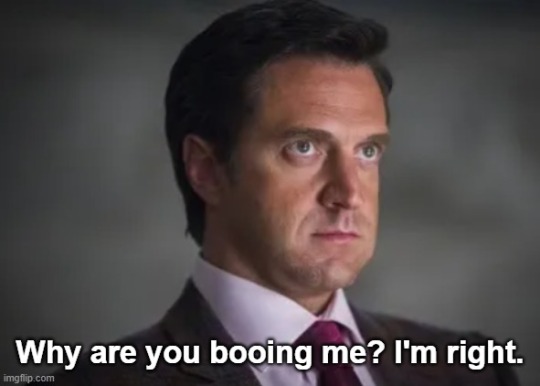
the "diagnosis" Chilton gave Will during his trial was the one closest to the truth ("Will Graham has never been diagnosed. He won't allow anyone to test him. He has carefully constructed a persona to hide his real nature from the world. He wears it so well, even Jack Crawford couldn't see past it. (...) There is not yet a name for whatever Will Graham is.")
unlike Alana Bloom or Jack Crawford, he saw what a manipulator Will was and that in front of them he played a poor, confused, wounded bird ("(...) A particularly-manipulative one at that. Poor, confused, wounded bird for Agent Crawford and Doctors Lecter and Bloom. And for me, well, I get the psychopath's triumvirate: charm, focus and ruthlessness. The charm, of course, being debateable.")
he believed Will that Hannibal may be the Chesapeake Ripper and said Jack Crawford: "Hannibal once served me tongue and made a joke about eating mine. It's hard not to at least consider it.". Jack ignored him. (I think Jack was already planning some large-scale action against Hannibal, but that's a topic for another post)
he called Dr Lecter "Hannibal the Cannibal"
he understood that Will Graham was alive because Hannibal Lecter liked him that way
criticized Jack for letting Will and Hannibal get closer to each other and then leaving Will alone ("You dangle Will Graham and now you cut bait. You are letting Hannibal have him hook, line and sinker.")
when Jack expressed hope that the relationship between Hannibal and Will was one of those friendships that ends after the disemboweling, Chilton told him: "I would argue, with these two, that's tantamount to flirtation. Will is going to lead you right to him." and let's be real, he was right.
#hannibal#nbc hannibal#hannibal nbc#will graham#hannibal lecter#hannigram#murder husbands#jack crawford#frederick chilton#my dumb-dumb babygirl is actually always right#i love him#hannibal meme#hannibal memes#hannibal shitpost#hannibal crack#hannibal meta#hannibal analysis#i guess#character meta#character analysis#frederick chilton meta#frederick chilton analysis#pesky--dust crack#pesky dust thoughts#pesky--dust analysis
5K notes
·
View notes
Text
"This Whole Situation"
Rise Ramblings #1
So as you guys know, one occurring phrase in the show between the boys and April is “This whole situation.” Although vague, and used in many other contexts, sometimes the family uses the phrase to refer to their mutations.
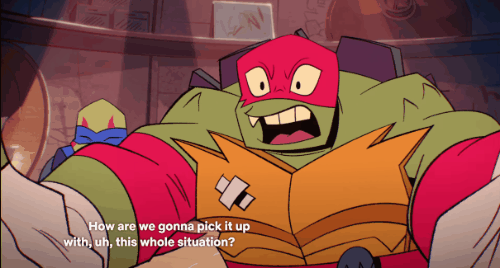
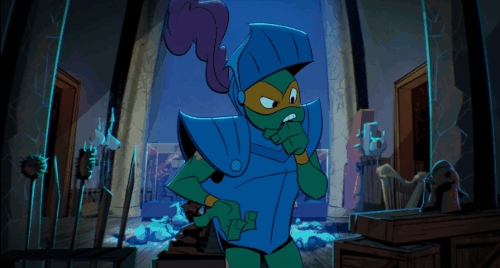
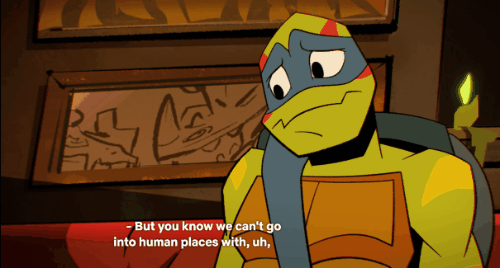
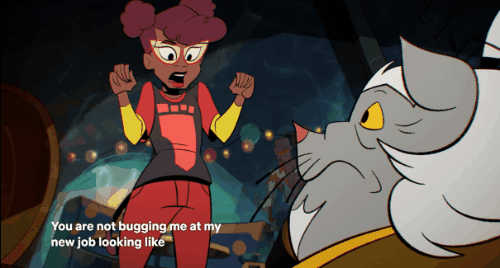
However, once finishing the series it’s hard to miss that Donnie never says the phrase. Now, I could be wrong (and If I am, just comment and let me know!) but I have a theory as to why Donnie doesn’t say it…
Donnie never says “this whole situation” because in his mind, there IS no situation.
The Evidence:
I started noticing something interesting about Donnie’s state of mind about himself.
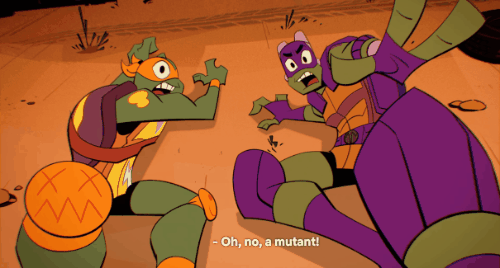
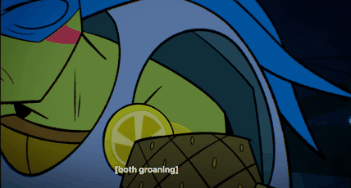
He never really expresses that he’s different from other people, he’s just…him. Obviously, he knows that he’s a mutant, but it’s not something at the front of his mind. I associate it to if someone has a certain attribute, that person is just that, a person first. I believe it’s the same for Donnie. He’s a person, that just so happens to be a mutant turtle, and I live for it.
What made me solidify my theory was the use of disguises in Rise, specifically the use of disguises in April’s school.
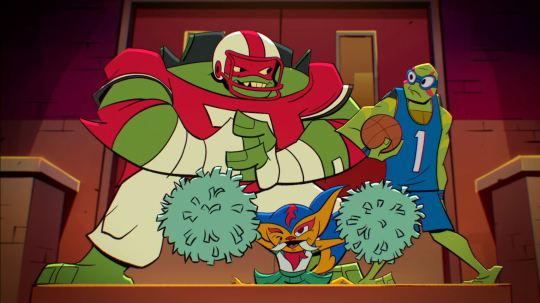
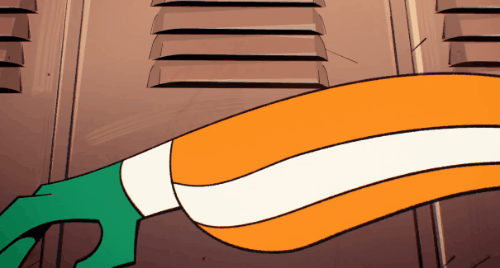
All of the boys have visited April’s school, and all of them decided to wear disguises, except Donnie.

He just shows up in his regular clothing. One could argue that the hoodie is his disguise, but then why did the rest of the boys wear actual (silly) disguises while our boy Donnie is just like, “Hoodie? Check.” And not only that, but for the whole episode, all eyes are on him, and he just. Doesn’t. Care. It’s glorious!
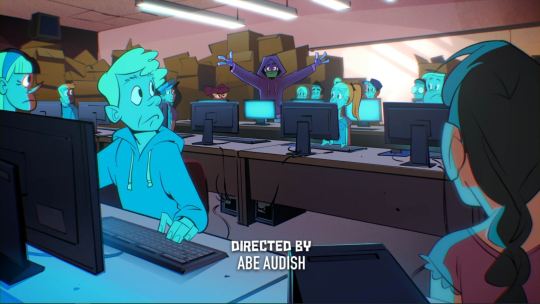
Later, in the episode Donnie vs. Witch Town, we see that Donnie showing up all willy-nilly pell-mell at April’s school was not a one-time thing. It’s literally been happening for years!
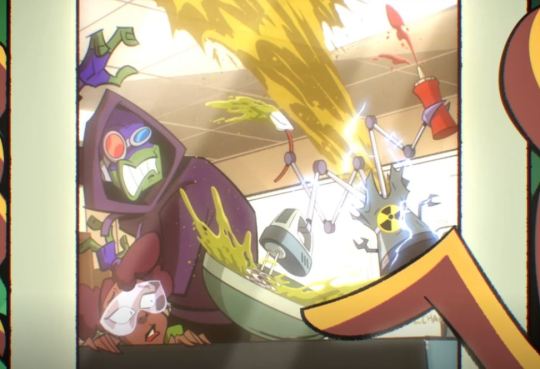
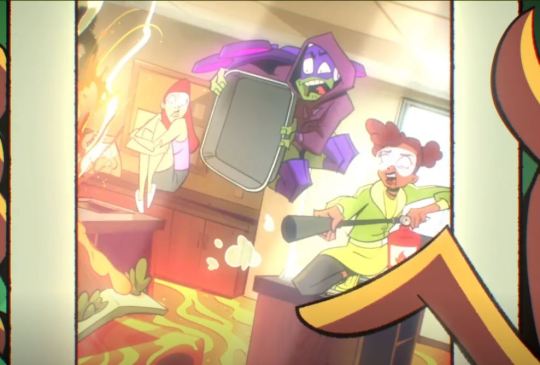

Therefore, I believe that canonically Donnie doesn’t care about “this whole situation.” And if someone does, as far as he’s concerned that’s their problem, not his.
○○○○
Part Two: On His Own Terms
#I rest my case your honor#the boy is people#he is what he is take it or leave it#I love him for that#I love that for him#I am aware that he has worn a disguise before but I have my own theories about that as well#stay tuned#rise starkiss analysis#rottmnt analysis#character analysis#starkiss ramblings#rise starkiss ramblings#rise analysis#Donatello Ramblings#rise donnie#rise leo#rise raph#rise mikey#donatello#michelangelo#leonardo#raphael#rise disaster twins#rottmnt donatello#rottmnt michelangelo#rottmnt raphael#rottmnt leonardo#rottmnt#tmnt#teenage mutant ninja turtles
3K notes
·
View notes
Text
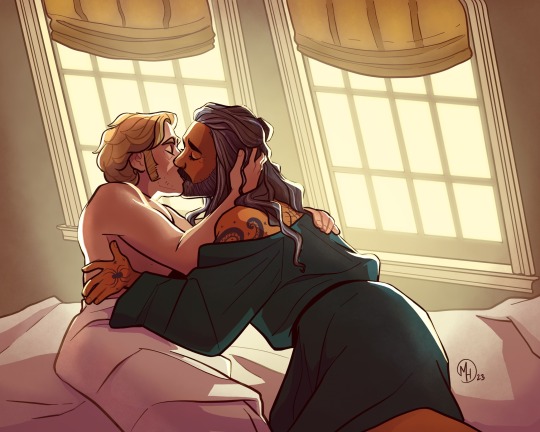
I am feeling fine and perfectly normal about them. :)))))))
#there’s a lot of very interesting meta and analysis going around and I love that#but I personally have just been staring at gif sets of these two and descending into madness#ofmd#ofmd s2 spoilers#ofmd s2#gentlebeard#blackbonnet#stede bonnet#blackbeard#edward teach#art#our flag means death
4K notes
·
View notes
Text
This episode really highlighted how close Marcille, Laios, and Chilchuck actually are.
The viewer is used to seeing our main characters behave like coworkers up to this point—even friends—and they express normal, understandable levels of concern and fear when their other party members are in danger. But when the nightmare attacked Marcille, it brought out sides of Laios and Chilchuck that the viewer hadn’t seen before.
Laios immediately notices when something is wrong with Marcille, and he tells the others as soon as he’s sure of the problem. Chilchuck and Senshi then follow Laios’ lead as it becomes clear that he intends to make her get some rest.
We see Chilchuck’s hands lay out the bedroll and Senshi’s hands set up the pillow, working in almost perfect tandem as Laios physically wrangles Marcille into bed.
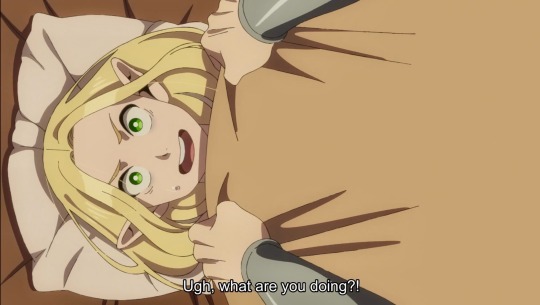
Senshi is in a similar perspective as the viewer, and mostly sits and watches the ordeal unfold. He doesn’t have a shared history, like these three do, so he helps in little ways, but mostly waits on standby for direction.
From here on out, it’s mostly Laios and Chilchuck who take over in planning how to help her.
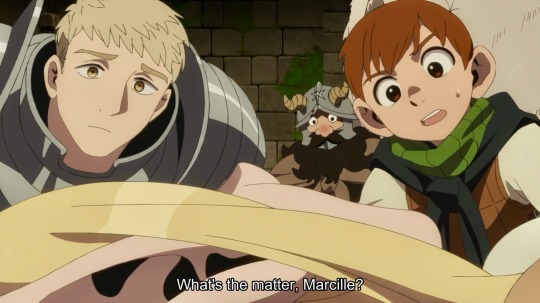
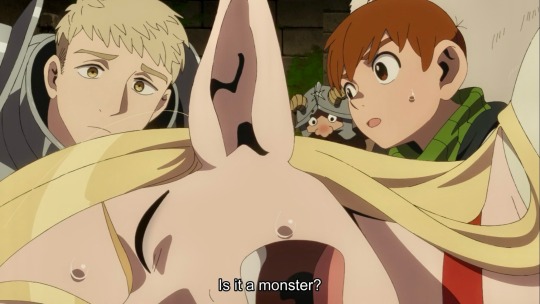
It’s uncommon for Chilchuck to openly show such distress and worry for one of his party members. He’s used to Marcille being able to defend herself; he’s used to her being capable and strong. He immediately defers to Laios for instruction, (rightly) assuming he will know what to do.
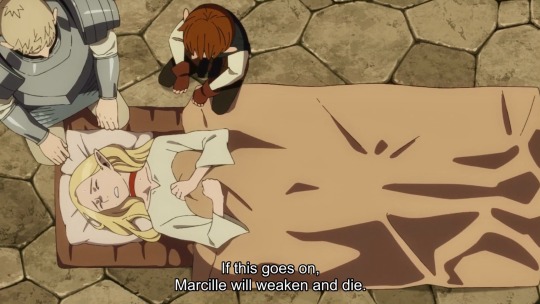
This actually produces a reaction close to real fear from Chilchuck, who outright SMACKS her in a panic to wake her up before getting any further information.
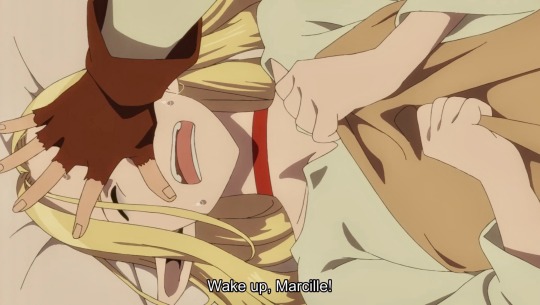
Laios has to quickly stop him, explaining that he could truly hurt her if he interrupts the attack this way. He tells them how he’s going to wake her, and he doesn’t hesitate. He jumps straight in, explaining what he’s doing for the others so that they (Chilchuck) won’t be afraid.
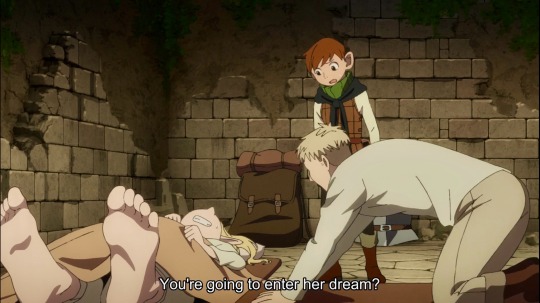
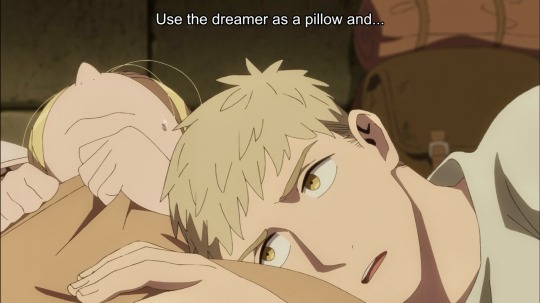
Chilchuck doesn’t question him once. He just does what he can to hurry along the process. He tucks Laios in with his blanket as soon as he lays onto Marcille—an unnecessary action that betrays how much he cares for both of them.
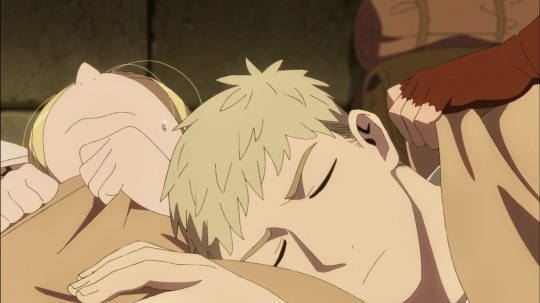
And Laios succeeds in helping Marcille out of the nightmare’s grasp. While trapped in her mind, he reassures her, protects her, tells her how much she’s valued and appreciated. He isn’t embarrassed or sheepish about it, either; he openly declares these things like it’s the most normal and obvious thing in the world.
He gets her out, he saves her. He did the exact thing he set out to do, even though he’d never done it before, and only had Falin’s secondhand information to work with.
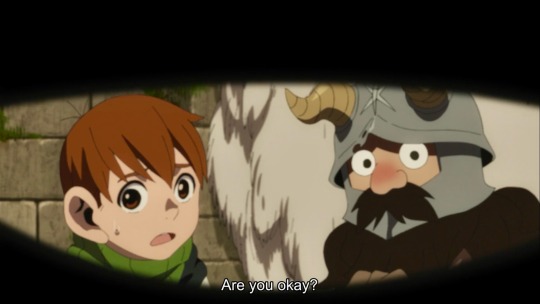
Once he wakes, Chilchuck immediately checks on him to see if he’s alright. Chilchuck is clearly still rattled, displeased with having to wait while both of his close friends were unconscious, fighting a battle neither he nor Senshi could see or help with.
Marcille wakes up shortly after Laios, but Chilchuck is still on edge, worrying that she’ll fall back asleep. Laios, too, has a moment of alarm when he makes sure she won’t close her eyes again.
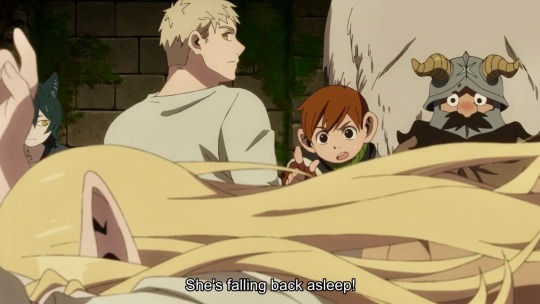
Once he takes the subdued nightmares out of Marcille’s pillow, only then do Laios and Chilchuck relax.
Laios, for his part, remained calm and collected almost the entire time. He did not show panic or fear when it became clear that Marcille was being attacked, nor when he told the rest of the party what he’d be doing to help her. And once the nightmares had been collected from her bedroll, he gently explained what happened, to everyone else’s horror.
Seeing this, it’s not a huge surprise that the Touden party is so successful. We’ve seen Laios handle danger with a level head; we know he’s capable.
But it’s an entirely different kind of talent to face a threat that’s targeting one of your closest friends—which can make even the most competent fighter sloppy out of fear of losing them—one that requires a high-risk, specific rescue style that none of you have ever tried before. And then pull it off flawlessly. Like damn, these guys are lucky to have him.
#i will never be normal about the interpersonal relationships of the touden party#dungeon meshi#delicious in dungeon#marcille donato#laios touden#chilchuck tims#senshi#izutsumi#senshi of izganda#dungeon meshi spoilers#dunmeshi#dunmesh spoilers#dungeon meshi analysis#dungeon meshi meta#chilchuck dungeon meshi#laios dungeon meshi#marcille dungeon meshi#you know i’m not above viewing this in a shippy light. but i love both platonic & romantic iterations so i’m happy either way#laimar#marchil#marchilaios#laimarchil#i’m just guessing on ship names at this point lmao
1K notes
·
View notes
Text
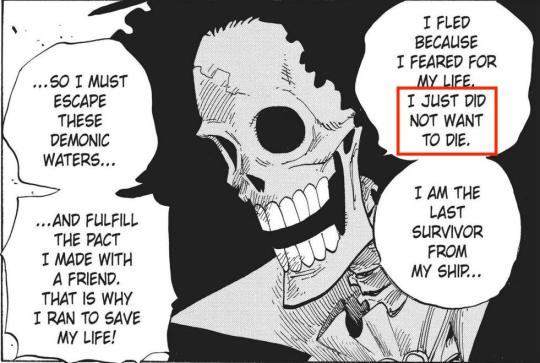
This idea is so, so important to the series in general, and Brook in particular. There are times in One Piece where people die for noble causes, and others where people act knowing that there's a good chance that they could die, but knowingly choosing death over life is never portrayed in a positive light.
As someone who views One Piece through the lens of Romantic literature, this is really important because historically the Romantics, er, well, romanticized suicide and death and the historic last stand. It's doubly interesting to me as a Japanese story, with Japan having its own long, complicated history with the concept of honorable death.
One Piece directly challenges both of these ideas, with life and living being romanticized instead, even if that means you have to get on your knees and beg for it like Brook does with Ryuma later on.
And it's a tightrope that story has to balance. Nami willingly lived under to boot of the man who killed her mother for years, but there came a time when enough was enough, and both she and the village had to stand up and fight for her freedom. She carried that lesson to her fight with Enel, even though she was hopelessly outmatched and would have been reduced to a greasy smear if Luffy hadn't shown up to save her. Within the context of the story both instances were portrayed positively, with Oda indicating through his writing that she had made the correct decision.
But that's not what's happening here. This is Luffy being willing to run away at Sabaody because he knew the Pacificas were too strong. This is Usopp lambasting the samurai at Wano for rushing toward their deaths rather than living to fight another day.
It's Brook knowing he made a promise to a friend, and doing everything in his power to keep it, even if it meant looking like a sniveling coward groveling at the feet of his own shadow.
#opbackgrounds#one piece#ch456#themes threads and throughlines#romanticism#brook#I love him so much#character analysis
2K notes
·
View notes
Text
Fucking FASCINATED by Astarion’s Test of Love with the nymph at the circus.
When she asks
1. When he’s happiest
2. What he wants most
3. What his biggest fear is
You gain approval for responding with the very surface level things that are a little true but not really the real answer.
1. Elbow deep in gore
2. Revenge
3. Breaking a nail
But getting the answers right and truly passing the test means gaining disapproval, because he is both upset that you are saying the quiet parts about himself out loud, and that you are revealing the deepest truest parts of himself to a stranger (the nymph testing you.)
1. Astarion has never been truly happy
2. Freedom
3. Being enslaved
There are so many ways to interpret this, so many ways to play the test out based on your character and your relationship dynamic, and it’s brilliant writing on Larian’s part in that way.
Personally, the way I interpret it is as a parlell to the mirror scene in Act 1.
Astarion is thrilled at what he admits is “shallow praise” because the shallowest parts of his appearance make him feel beautiful.
But, if, when “being reflected through someone else’s eyes” he is instead met with objectively true and more unique qualities of his, like laugh lines and the way his hair curls around his ears, he becomes distressed and begs to just be told he’s beautiful.
Astarion puts a LOT of work into performing his outer persona just as he wants it, he puts a lot of work into controlling how he is perceived.
When in the mirror scene and the Test of Love someone sees past that immediately, seemingly with little effort, he doesn’t know how to handle it.
#bg3 spoilers#bg3#bg3 astarion#astarion#baldur’s gate iii#Baldur’s gate 3#analysis#meta#character analysis#gods I fucking love this game
6K notes
·
View notes
Text
i feel like the reason aang isn’t as adored and beloved as he should be is because he’s the protagonist but he’s also not an archetypal western classical hero. i don’t agree with the entirety of that “avatar aang: feminist icon” essay because i think the role of patriarchy and gender in atla is more complex than what that essay posits, but he definitely complicates the masculine ideal of heroism and generally does not conform to patriarchal notions of masculinity. which is very deliberate, especially as contrasted with sokka and zuko’s explicit struggles with the imperialist/colonial standards of an aggressive, militaristic, and chauvinistic masculinity. aang is subversive because he represents an absence of war in a world ravaged by it. through his link to a (somewhat more) peaceful and harmonious past, he represents a better possible future. as katara would say, he brings people hope.
but people don’t like that he’s not visibly edgy or tormented like zuko is (even though he’s a far more tragic character than zuko is, just fyi), that he isn’t “cool” (even though he’s literally the coolest kid ever, just fyi), that he “gets the girl” (even though if anything, she gets him) despite being twelve and bald and nice (the horror!). katara is the more classical hero of the narrative, as its narrator and its catalyst, the adventurous revolutionary who gradually learns to control and use her powers and eventually becoming a force to be reckoned with. zuko is the classical anti-hero of the narrative, his “redemption arc” constantly hailed as one of the greatest character arcs in television. so people expect katara and zuko, as very obvious narrative foils who parallel each other every step of the way, to be the obvious couple, because based on every romance narrative we’ve been inundated with throughout our lives, within our patriarchal society, they “just make sense together.”
but as much as katara is a protagonist in her own right, aang is the show. the title quite literally represents the central thematic tension of the entire narrative, the colon illustrating the implicit divide between his duties to this brave new world in desperate need of justice and balance, or his duties to his extirpated culture as the last true voice among them. aang is the central figure because this tension represents the crucial ideological battle happening across the entire show. aang is the avatar because he is the only person in the entire world whose values have not been shaped by war.
people constantly laud zuko, in particular, for being the most interesting, complex character in avatar. but i personally don’t even think that’s true. which isn’t to say that zuko isn’t fascinating in his own right, of course, but rather that he’s certainly not the only complex character this show has to offer. he just happens to monologue about his anguish constantly. but aang wasn’t raised as an imperial prince, and so he approaches the world, and his own pain, in a very different manner. the reason he immediately goes to ride giant koi on kyoshi island, mailchutes in omashu, and otherwise goofs around after learning of the shocking ramifications of his people’s genocide is because that’s how he copes with his pain. unlike zuko, who never stops talking about his aches and yearnings, aang represses his trauma and hides his tears behind a mask of upbeat cheerful goofy twelve year old antics.
until he can’t anymore. until he snaps. both katara and zuko wear their hearts on their sleeves, and that includes their rage. but aang’s rage is dangerous specifically because it represents that he has been pushed past his limits, that the conditions of this world in which he is a perpetual stranger, temporally displaced and dispossessed, are intolerable. that peaceful reconciliation is impossible. and the fact that he persists beyond that breaking point, over and over again, to firmly and resoundingly establish his ideals even as they conflict with everything he has learned about this world, a world that is not his own even as he can never return to the world he once knew, is what makes him so unique, so powerful, so beautiful.
i know that aang isn’t the typical hero, neither narratively nor aesthetically, but really, that’s the entire point. the world, our world, needs something other than what we have now. we need someone who will not succumb to the ideals of domination and victory through violence to assert themselves. we need someone who stands firm in refusing to kill the firelord, even as everyone he knows tells him otherwise. we need someone who knows that darkness cannot be vanquished through more darkness, but can only truly yield to purifying light.
and sure, aang is a child, and often acts childishly. sure, he’s not conventionally handsome and alluring. but one thing i will never understand is how that somehow negates his appeal to the masses. because even if you don’t appreciate how crucial he is to the themes of this narrative you all seem to love so much, how can you not love his adorable little face? his precious little laugh, his zest for life, the infinite well of love and kindness he holds in his heart? people who hate aang are crazy to me. because you are, quite literally, hating the world’s most precious baby boy.
#aang#katara#zuko#analysis#hot takes#sorry this one is kind of all over the place#very stream of consciousness bc it’s loving aang hours#and he’s not only meaningful narratively#but he’s also just SOOOOO CUTE#I would literally pay money to babysit him#which I think defeats the point of babysitting but whatever#he’s just. so precious 😭😭😭#also fwiw I don’t really fw kataang either but like. it does make more narrative sense than the alternative#and if it had been executed better . well. who can say
1K notes
·
View notes
Text
The problem with thinking Hannibal loved any other character besides Will (and Mischa) is that he literally destroyed his whole life, his carefully crafted life and security and comfort and freedom and EVERYTHING, because he felt love for Will. He lost his mind. It's not something that would happen if he was used to the feeling of love. He might like, or even respect some people, but love? This doesn't really add up to his own behavior. He tried to REVERSE TIME. REVERSE TIME. This is a guy who never thinks he's wrong or tends to justify his wrong doings, and he regretted what he did just because he couldn't have Will. He never felt this for anyone else. He literally ATE his own SISTER because he loved her and that made him feel weak and vulnerable. I don't think he comes even close to loving anyone else. He might find them interesting and pleasant to be around some times, and even cares about them to some degree, like Abigail, but he only cared because he projected Mischa unto her and because she was a mediator between him and Will and his fantasies about having a family, but love?? LOVE??
#that cannibal heart beats only for one person yall#and its not a ship thing it's just logic i dont think it makes sense with how he behaves in general#he is PASSIONATE but i dont see how he could love someone else#nbc hannibal#hannigram#hannibal#will graham#murder husbands#hannibal lecter#hugh dancy#mads mikkelsen#analysis
2K notes
·
View notes
Text
Falin who cares too much and too little - analysis
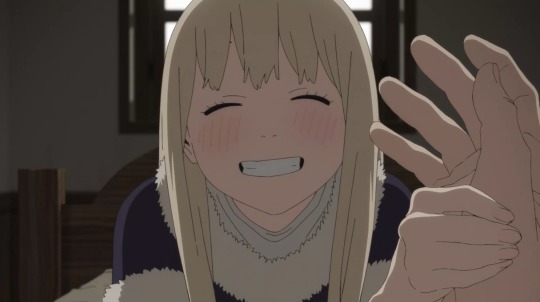
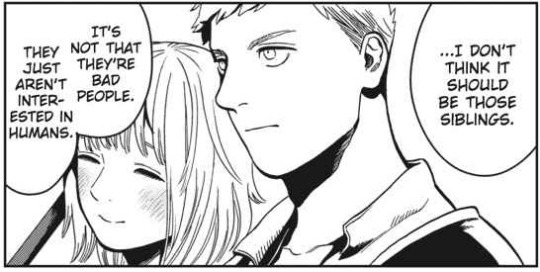
Been stewing on Falin thoughts for a while, I know I have an interpetation on her that differs from many but I’m jumping into the fray. I think there’s a lot to be said about what we do see of Falin.
This shorter Falin analysis I made is pretty much essential prior reading. This analysis mainly explores her complex relationship with caring and so it’s sort of structured in two halves, with Faligon at the crux of it all.
Falin cares too little :
A lot of people assign Falin a people pleasing mindset and I… Don’t agree. We never see her care at all about people in her town or at the academy not liking her.
We do see her worrying about what people think of her… ONCE. And Laios comforted her, told her they didn’t matter and she should be proud of herself. She latched onto that hard. That’s why this scene was so important to be included during the dragon fight, relationship-defining; it’s always been them against the world. She grew to not care what others thought, to only focus on her close loved ones. No one else matters.
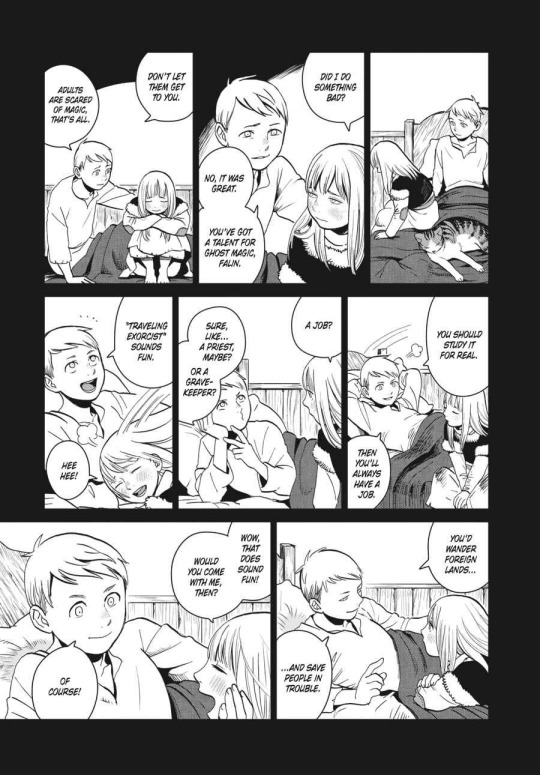
Laios’ words were her world. Her older brother who taught her how to feel comfortable with herself, who told her, you’re great, others are the ones in the wrong to not see that, I’ll always be with you, always be there for you. Older brother who always made great plans, who always knew more, who was better at wrestling to name the dogs, who she has always idolized.
Laios who always spoke of traveling the world, to which she always said she wanted to follow. And she would, she’d follow him even if it meant leaving the academy and all she knew behind, she’d follow him to the ends of the world, and that’s what she did.
She didn’t care about showing to her classes or keeping up such appearances, she doesn’t even think of toning down her jumping into bushes when Marcille recoils, etc. She acts like an obedient pawn often, to her parent’s directives and then following Laios around no matter what he decides to do, but I don’t think the motivation is people pleasing, rather it’s being with & caring for her loved ones, and her go-with-the-flow attitude enhances the impression. Not that it’s as simple as that, mind you, but let’s talk about this for now.
Falin is perceived as selfless because we, the audience, have our perspectives revolving around the main people in her life (Laios, Marcille). They’re the ones she’s devoted to and people who care about her back a lot too, but to people like her classmates or the towspeople she probably must have seemed like someone who didn’t care about the people around her or her surroundings a lot, who just went on alone and did her own thing.
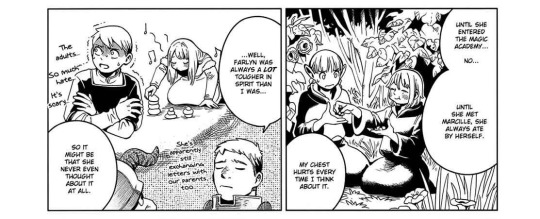
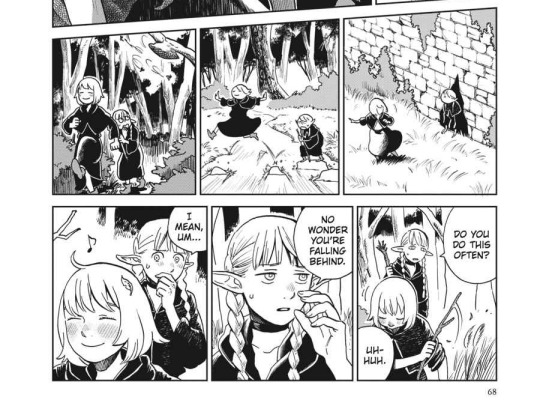
What matters to Falin? From what place does her kindness come from? Is a part of her keeping up appearances?
And I think that’s the point, the horror of Faligon as well, that we can’t tell just how in control Falin the person is as the chimera (because we are shown that she’s in there, we just don’t know at what degree), that we don’t know her enough to be able to tell when she’s at her most genuine, her most raw. That even if you do settle on none of her being present as Faligon, we have to at least consider it, consider that she may be able to do something like this and have a part in it, brutal and uncaring. That even the lenses we see her through, the people who love her, may be unreliable.
And this is what’s very interesting about her too, she truly is so idealized by people around her as a saint. She’s so good and kind and caring to everyone etc etc etc. Laios, Toshiro and Marcille all see her as the paragon of goodness in the world. More cynical characters like Namari and Chilchuck have more layered opinions on her, the latter finding her somewhat unnerving because he can’t read her well. But then with that one flashback scene we see that… Her priorities are intensely focused on Laios and Marcille, she doesn’t care all that deeply about anyone other than them (+ maybe her parents). The rest of the party is in the same danger here but only Laios and Marcille who she’s speaking to get the special ,ention, and if they don’t cross her mind then of course she’d be ready to sacrifice strangers through a risky teleportation.
That doesn’t make her not kind or caring!! Just that greater good isn’t exactly her priority. Any means is alright if the end result is her loved ones safe, it usually takes the form of healing and caring, but we see she’s ready to fight and make dangerous calls too. To me there’s this aspect to her that she isn’t as pure and magnanimous as everyone thinks she is, both in-world and interestingly enough meta wise as well, and there’s something interesting to that.
People pleasing implies a need to be liked, needs for the motivation to be that. A yes-man, etc. But if we analyze Falin, her general kind, smiling demeanor is more a matter of passivity I yhonk. Conflict avoidance is easier, so she’s friendly and hopefully things’ll be smooth sailing. It’s easy to be kind to classmates even if they act wary and rude if you don’t care about what they think either way. Of course she prefers good things happening to people over bad things, she is genuinely kind, but I think people tend to assign her a very grand altruistic way of life when to her the motivation is pretty self-centered. She doesn’t do what she does because she loves them, but because she loves them.
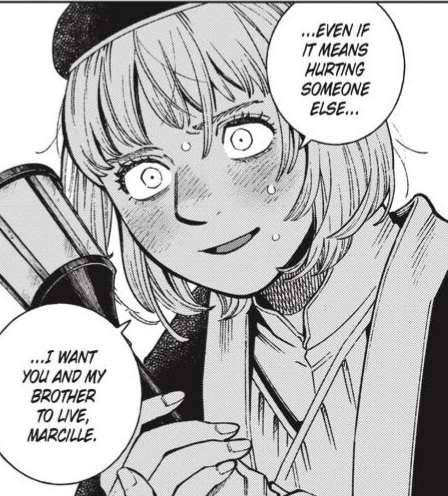
One situation that’s interesting to dig into for her way of thinking, and what I’m trying to get at, is Shuro’s proposal to her. I’ve seen people saying she hesitated because she didn’t feel comfortable saying no even though she wanted to, "I can’t say no, I don’t want to hurt him", something that sounds sensible and familiar, but it’s actually canon in the Adventurer’s Bible that the reverse was the case, that she didn’t feel comfortable saying yes. Because the offer was tempting, but it’d have been a loveless agreement on her end.
And it makes sense she’d want to say yes too, like we see with the Toudens, marriage is very much a political strategical economical thing in their village, there’s even a bit on it on Laios’ Adventurer’s Bible profile about dowries, and both siblings were engaged very early. They lived poorly for a long time, it’s an enticing idea to marry rich, to have not only yours but your brother’s needs met forevermore easily, which at one point in their careers was their main worry and goal. Why shouldn’t she accept a life of leisure and wealth handed to her by a lovely friend?
So her hesitance was "yeah that’s convenient for me, but where it’s everything to him and heartfelt I’m able to be detached because I don’t care about it that much… Can I do that? I’m not reciprocating, not saying yes in the way that matters. Can I do that to him?"
Very caring even though it’s not what you’d expect, isn’t it?
And central to my analysis, where I’m going with this is, I feel like that’s the thing with her character, that she doesn’t feel as strongly as she "should" sometimes, or feels a different way than she "should", or at least that she feels that way and others say she does.
She didn’t mind suddenly leaving the academy, leaving Marcille behind and not seeing her for 4 years. She acted like it was no big deal that she sacrificed herself after getting resurrected after the red dragon fight. And in both those cases it upset the people around her greatly that she didn’t seem to get why it was such a big deal, didn’t seem to care about how they’d experienced her choices.
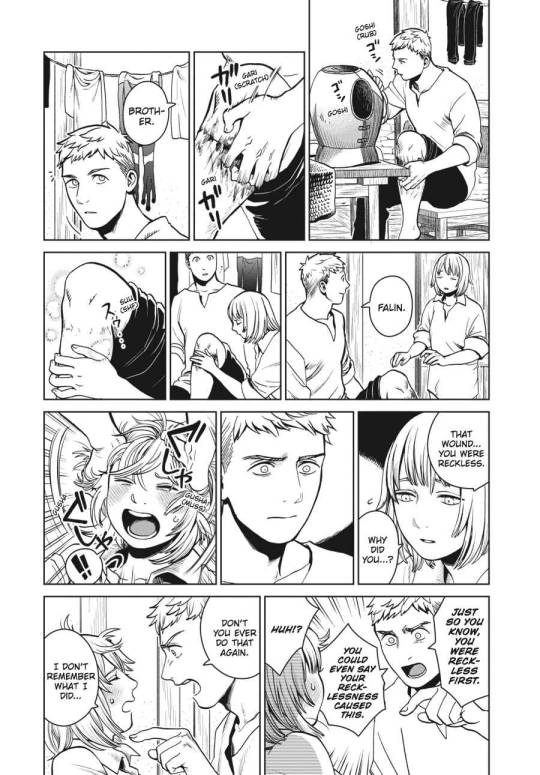
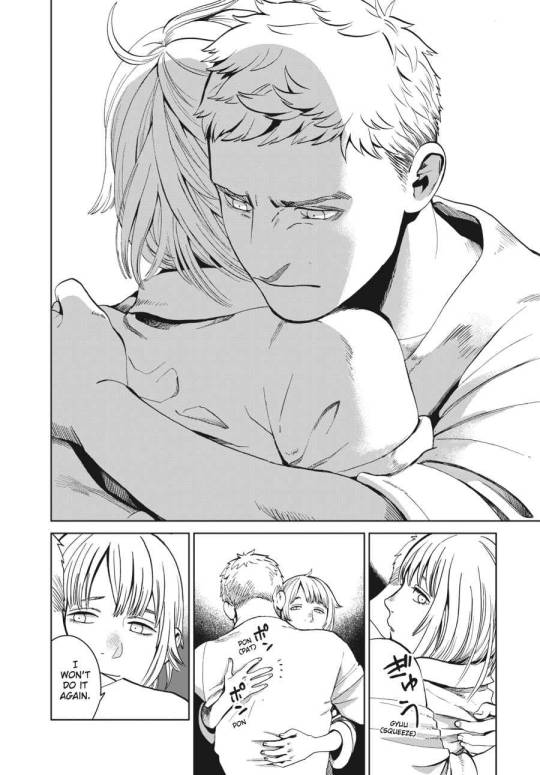
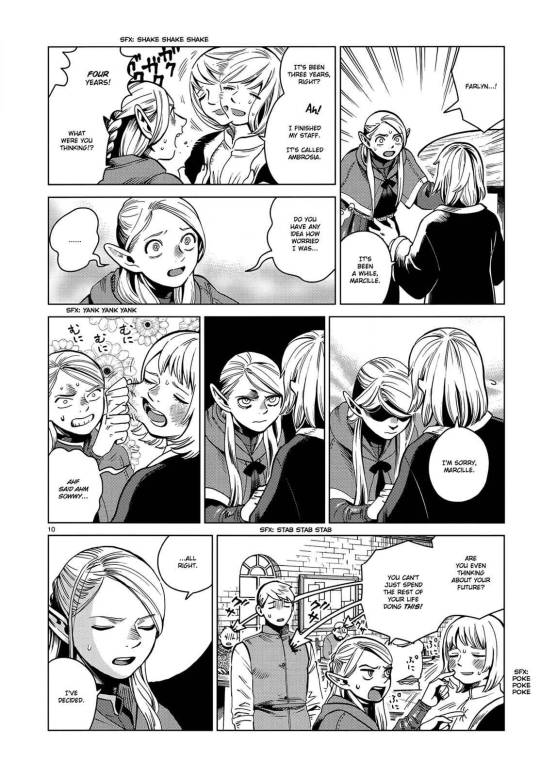
So it’s a tendency… And it’s not that she doesn’t care, it’s just that the way she measures what’s good for the ones she loves isn’t the same as what they themselves think it is (like Laios and Marcille not wanting to be apart from her). It’s an overt but quiet kind of care, it’s doing things like following them around and making sure they bathe and have a meal, even if that means she has to be dragged into misery too.
So yes she probably would know "not caring enough/the right way" is one of her perceived flaws, and that informs how she tries to handle her response to Shuro’s proposal. Her not wanting to accept like her first gut instinct, is because she’s thinking about reciprocity, about if it’d be right to go into this knowing that they have different priorities and she might not be able to keep up with the type and amount of emotions he wants/expects from her.
And that’s a big part of her character isn’t it, having expectations pushed onto her. Her trying her best, but in her own way that may seem odd or even unfeeling. Not unlike when she exorcised the ghost as a kid too, unblinking and matter-of-factly, and not seeming to understand why people stared the way they did.
Even though she answered his proposal only post-canon, she’d been pondering it for a while even pre-canon and the Adventurer’s Bible explanation was released midstory, so I’m hesitant to assign her much growth about her hesitation and what I went on above, since she still didn’t react "right" with Laios after the red dragon fight (even if she apparently doesn’t remember sacrificing herself) and put herself in that situation in the first place. She hasn’t finished her arc on that flaw of hers is what I’m saying, she for sure still has it, but I certainly think her thoughts on Shuro’s proposal shows awareness, both of herself and social.
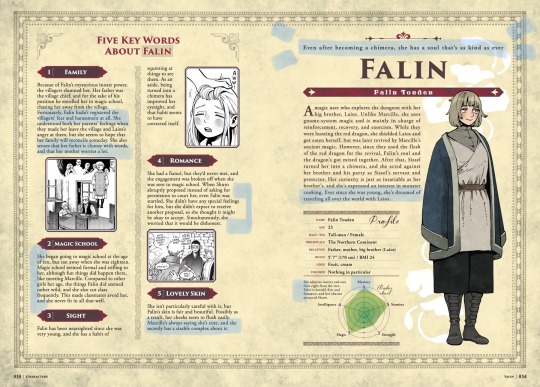
And awareness is a big analysis key word with Falin, especially here it can be hard not to conflate not caring with not knowing. How socially aware is she?
It’s rather layered, because canonically she wasn’t aware of her ostracization in her hometown at all, and we’re not sure if she knew Shuro was interested in her before he proposed, but she generally seems more socially aware than Laios. She tags along on his caravan job to make sure he isn’t being mistreated (though doesn’t ask he get a salary), she catches social faux-pas more easily like in the genderbend magic mirror omake with Shuro, and interestingly enough she’s very good at empathizing with her parents and understanding their perspective. We see when she’s worried about Marcille coming that she does know about propriety and how appearances shape impressions. Being a chief’s daughter must at least have taught her a thing or two on that front.
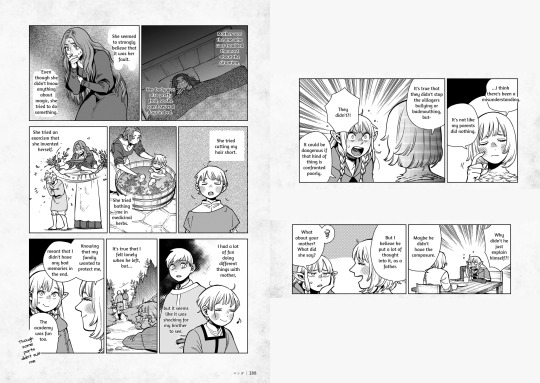
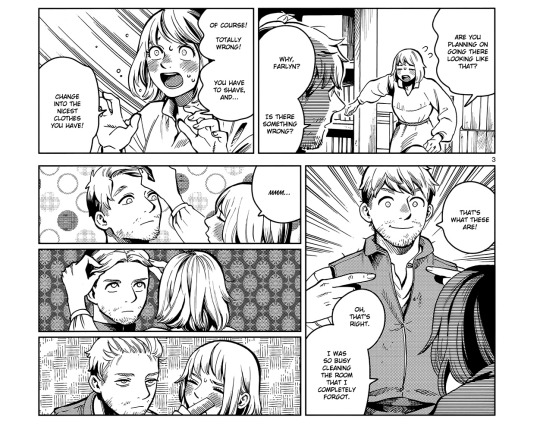
She never stands up for herself, but when it comes to defending others she worries, strategizes and explains.
And this sort of understanding is part of why I think she’d notice the expectations pushed onto her like I was saying earlier, notice how she makes people feel when she’s careless. But if she changes anything about herself in response to noticing is for her to choose, and generally I think it’s a sort of inbetween of yes and no: that she becomes more complacent but also more reserved, complying but by hiding more of herself passively. She’s not sure wether to accept or reject Shuro’s proposal, doesn’t want to lead him on? She’ll just be taking a while to silently consider it, try to keep things as they are for the time being. The third, less conflicting option. She doesn’t feel heard by Marcille who keeps infantilizing her? Just bear with it. Retract yourself emotionally. Settle for it.
We see that when she was young she had a tendency to not read a room, and I think that’s here too. She doesn’t get why her nonchalance upset others but that doesn’t change that she doesn’t want them upset or hurt, so she tries, albeit in maybe a roundabout way. She always had a hard time deeply connecting with people, often keeping herself some amount of emotionally distant: erasing herself from the equation, from the two-way trade that relationships are and making it a onesided thing instead, where all their needs and emotions are directed towards her but she only lets out a bit of her own show. She takes everything upon her and deals with it and tries not to give others this same burden, though not on a conscious level, it’s just that she’s learned growing up that she doesn’t have much agency.
Like I went into with my analysis linked at the beginning, I think Falin is used to just taking what she can get and not asking for more, when it comes to social bonds.
She’ll take spending time with her mother no matter what it is they do, she’ll follow Laios to the graveyards and stick by him even when he’s pushing her away (because he doesn’t want her borrowing his book or "No copying!" or such). Her father was always distant, cold and uncommunicative, her mother was considered sick from anxiety and the exorcism attempts were the main way they spent time together, at dinner tables there were only her and Laios.
The dogs picked on her too even if she loved them— And so did the townspeople, maybe that being normal to her at home is why she didn’t notice the ostracization she suffered.
She’s always been the last to be asked about decisions or what she wants, never asked to play with at recess, neither her father or Laios asked before sending her to the academy or leaving the village.
At home, in the hierarchy she was considered to be below the dogs by the dogs themselves, as someone they can disrespect. Dogs learn from example and behavior, so this means Falin must have been pushed around a lot, and that the family didn’t try hard to rectify the dogs’ misconception, likely worsened by Laios regularly wrestling with her as a competition.
So for example when Falin showed Marcille food, it was her way to implicitly ask to have lunch with her without voicing that question, without daring to take up space. Someone’s presence isn’t something you ask for, it’s something that’s bestowed upon you, you can follow them around but you can’t ask them to stay or to come with.
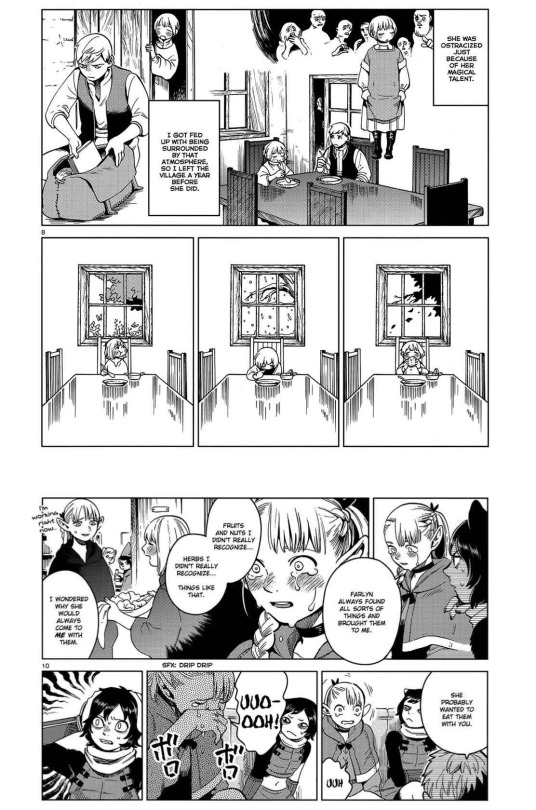
She’s used to her needs and wants not being listened to, so she’s learned to have less wants. Caring less about herself, caring less about other people beyond her safe zone, was a defense mechanism in part.
She has a sense of learned helplessness too, like how when Marcille came to take her away from Laios, even though she didn’t want to leave with Marcille it felt so determined and unshakable to her that whatever Marcille decided Falin would have to comply with.
And still, it’s the "marrying you would be awfully convenient if it wasn’t that I’d feel guilty for not loving you back, the way you wanted me to when you proposed to me" and the "I don’t regret leaving the academy and leaving you behind without goodbyes but I’m sorry that you’re so much more upset about it than me". It’s the guilt of not loving people back the way they want to be, with the same intensity or fervor.
It’s the autism it’s the aroace of it all, it’s the emotional stunting and confusion but the pit in your stomach telling you you did something wrong again. The no object permanence even for people you love even for 4 years, it’s the feeling like you’re somehow at fault for someone having fallen for you and not knowing what to do with any of it.
I’m not joking btw it isn’t uncommon for autistic people to not see their close friends for a long while, not having missed them all that much and for that to be really hurtful for the other if they notice/ask about it. "Hiii bestie! Oh umm you’re uh more emotional about this than I expected, hopefully you won’t feel alienated by me not feeling as intensely about it…"
So… Yeah. I think she thinks of things and relationships in a different way than most people, and beyond "good things happening to people is good" I don’t think she actually cares about people all that much. I’d argue that Laios shows more desire to connect with others and make relationships. And just like with Laios and his own issues with humans, that doesn’t mean her kindness is a lie or ungenuine or worthless!
It just means that like, well it’s pretty straightforward really, she’s not all that social and doesn’t see casual bonds as meaning all that much and whatnot. She does want to see people happy, but it’s not as much like… A conviction or goal. She’s too laser focused on a select few people. "It’s not that they’re bad people, they just aren’t interested in humans."
And sometimes it feels like people get defensive about Falin in a meta way too, like if you ever so much as imply Marcille isn’t her whole world or that she isn’t the kindest soul out there then you’re saying she doesn’t care at all or she’s evil. And that’s actualy exactly the sort of vibe I wanted to get through with my analysis above here actually haha, that she does care and she is kind but it’s not in a way that’s quantified or understood in a way that makes people feel comfortable. In a way, that makes people feel insecure because they don’t have the same logic as her, don’t show love the same.
And I think this is another stellar depiction of autism, of parts of it that feels unpalatable to many, if I’m making sense. The fandom idealizes her as well, which isn’t uncommon or surprising for the character embodying the trope of the perfect beloved to rescue.
And disclaimer, as I said in the tags I feel like the details of Falin are pretty vibe based when it comes to analysis, there’s absolutely a valid angle where she does super care about everyone always, feel free to disagree with me on the overarching angle of my analysis. There’s enough supporting evidence to tip the balance either way I think, and the reason I’ve chosen this angle is I feel it’s more compelling for the themes in Dunmeshi of idealization and being different, of desires vs wants, and because I think it neatly ties up Falin’s character arc as I’ll go over throughout the next section…
So.
Not feeling as much as she should. And……. Is this not Faligon pushed to the max?
You can’t tie down a dragon. As the chimera, she gets to just not care about everyone else and be on her merry way.
Part of it I think is finding comfort and freedom in the mindlessness, in not having the burden of feelings and connections and a consciousness (despite still ending up seeking those in a stranger, Thistle).
Like when she’s dead in the purgatory as well, she gets to just… Hang around and do whatever. Similarly to when she played in the forest instead of going to class in her academy days. That’s what freedom and peace of mind looks like to her. Why she decides to roam post-canon, if only now with the goal to find herself instead, with her mind in tow and somewhere to go back home to.
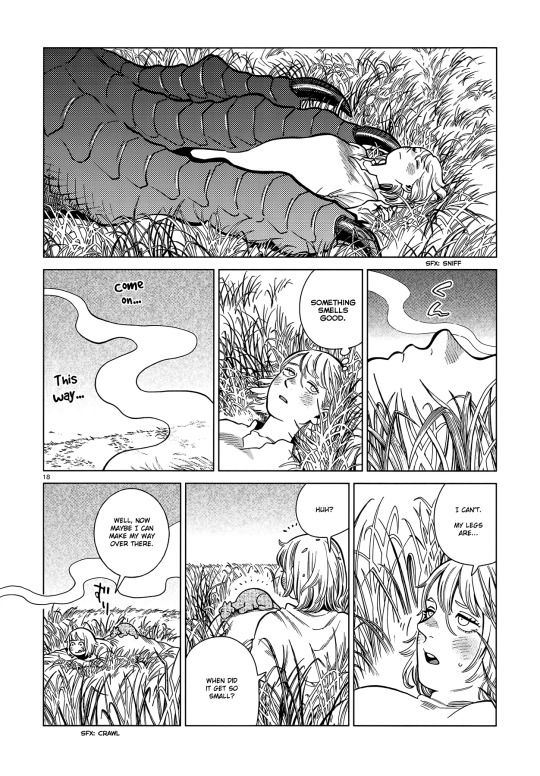
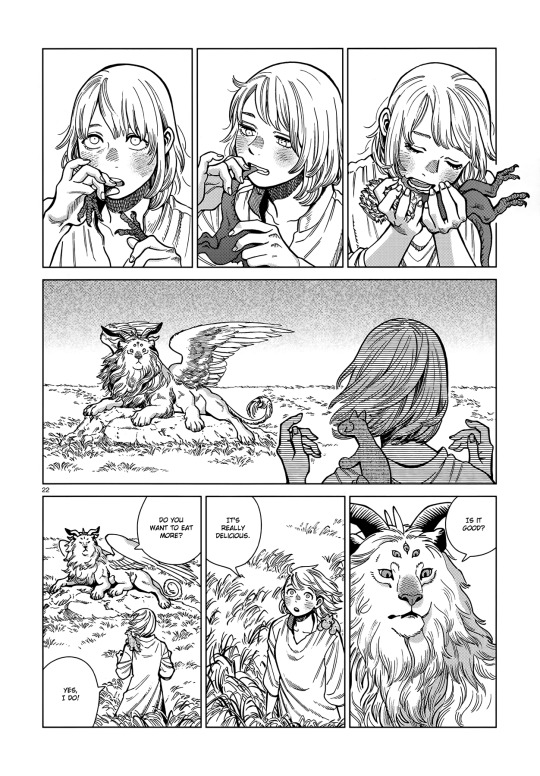
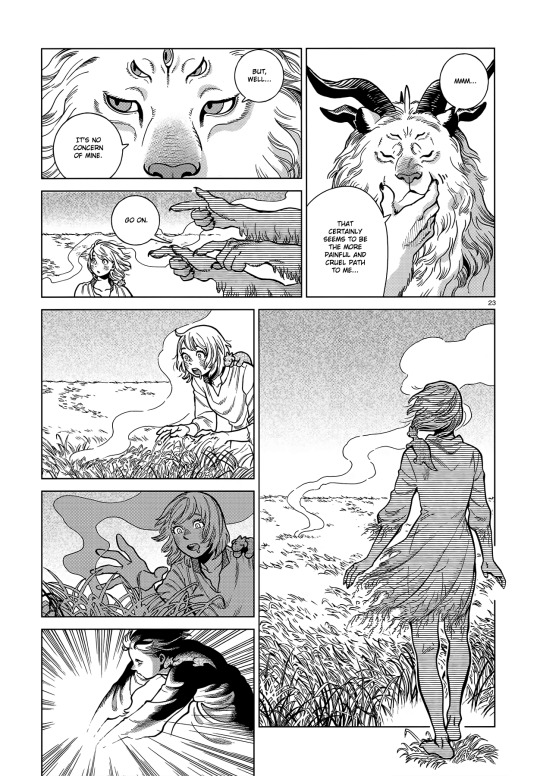
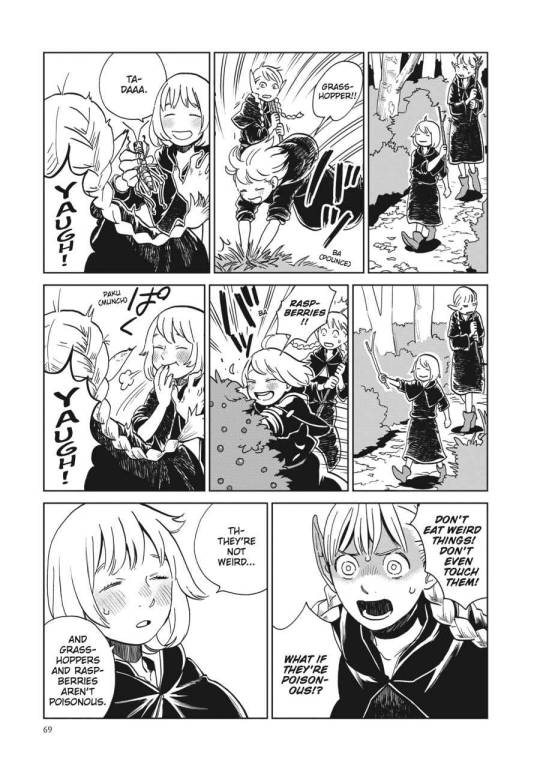
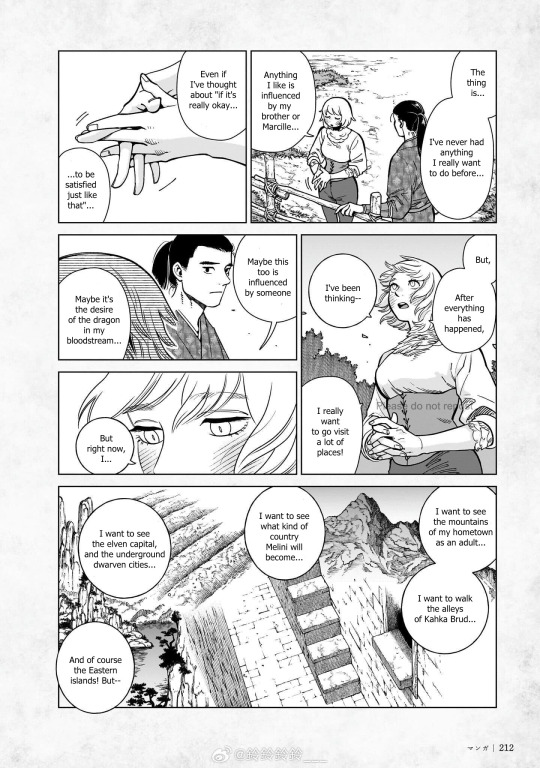
There’s excellent analytic framing out there about how of course, Dungeon Meshi has a big theme of grief and letting go, and… Falin was always a symbol narratively, idealized by characters and often underconsidered by them despite their love. It was Falin’s choice to sacrifice herself for Laios, she thought it was worth it, knowing that it would be her end. Her resurrection and the process of it intertwining her soul with a dragon’s wasn’t done with her consent, and the subsequent opening it gave her to become a chimera puppet. She’s stripped of her agency consistently, and so… It’s very noteworthy that the final choice, of wether to go back to life or to stay dead, in that purgatory scene, was up to her. And she chooses life, but I do think about her in those fields and how at home she seemed there. Peaceful, by herself in a vast calm expanse she could explore, free.
Personally, I think freedom is Falin’s own subconscious selfish desire. And though to us becoming the chimera is obviously a shackle, I think it felt like freedom to her somewhat, too.
And if you think I’m going wildly off the rails here I want to talk about Laios’ wish of becoming a monster.
And to be clear before getting into it, being mentally a monster is absolutely a big part of the appeal for Laios, it’s something that’s consistently referred to, something especially pointed out in the werewolf monster tidbit with Lycion. Right panel is from that, but left panel is from the extra with Izutsumi where Lycion talks about suppressing souls in a beastkin body, the human or the beast soul.
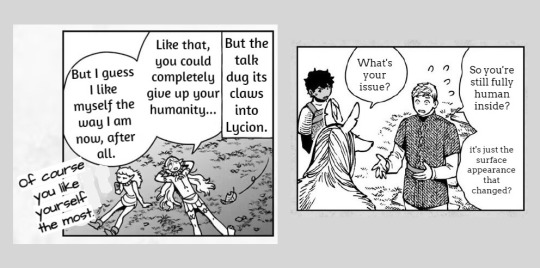
Finding comfort and freedom in being mindless, less sentient, less aware? While being unaware in her hometown might have saved Falin a lot of heartache although perhaps stunted her emotional growth, it’s always been Laios’ curse.
Actively, through his choices, he seeks to grow closer to people, to form deeper bonds, to understand and be undertood, but… On a deep seated level, what he desires is to leave humanity and civilization behind. He has an irrational hatred for humans, born from the trauma of ostracization, being different, being beaten up and rejected consistently through his life. Running away from problems is easier. He wants to be free from being a social animal from a social species who has deemed him the black sheep, he thinks it’d be simpler to just leave it all behind, people and his own humanity.
At its core, to Laios becoming a monster is a power fantasy, a coping daydream of "if only I could be strong enough to never be hurt again, the power to destroy anything I want, the power to go somewhere better, if only it was possible for me to never feel hurt again. If only I could be someone, something, that can never be hurt". "If there’s someone you don’t like, you can gobble ‘em up in one bite. If you could fly, you’d be able to leave this village right now." It’s a childhood fantasy, from a deep sense of being misplaced and a desire to be able to stand fearless, thinly covering up resentment that Laios represses.
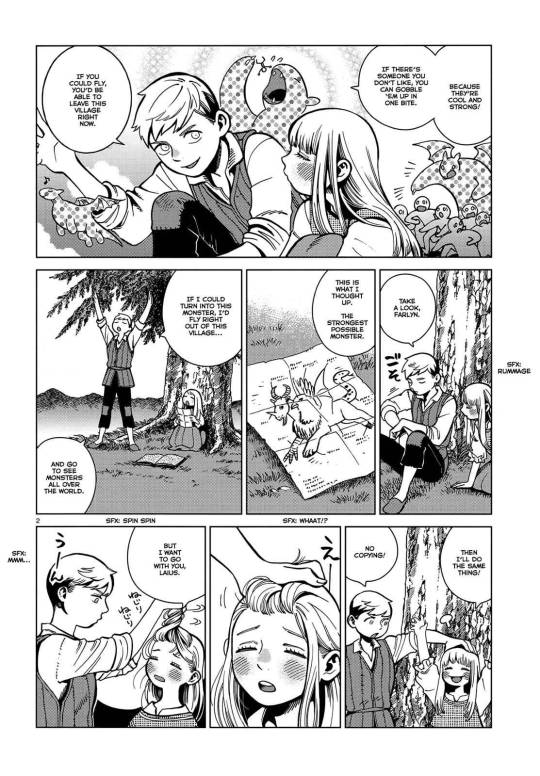
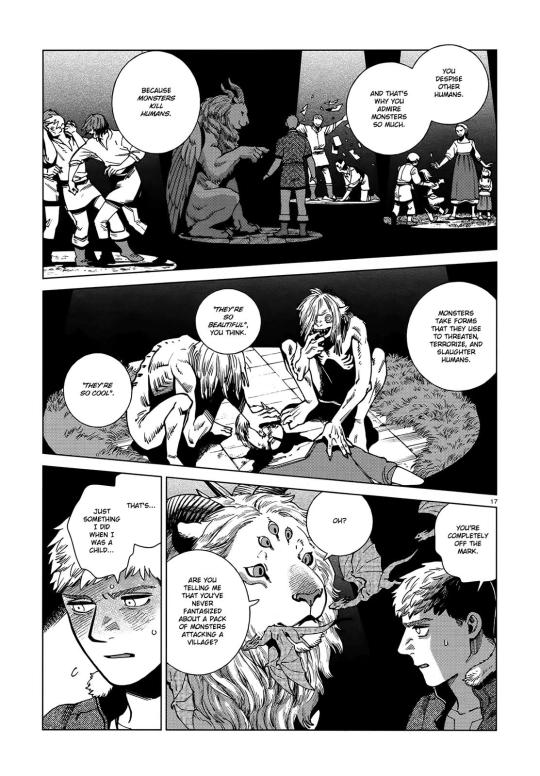
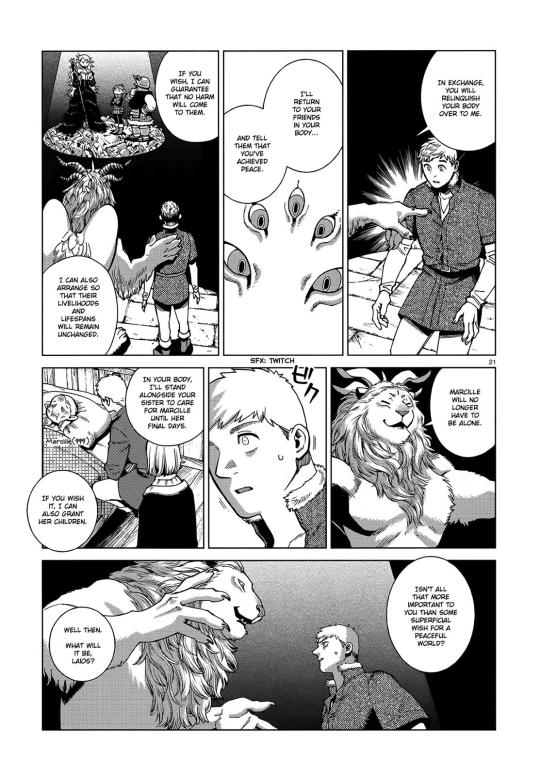
But you’ll notice, when the Winged Lion is enticing him in the last page, even now with his lifelong wish of becoming a monster on a silver plate, he still cares about his friends. He still has that sense of responsibility to his friends, doesn’t want to leave knowing they’ll be in danger and alone. The offer that his friends may be left unharmed is already good, but Laios also visibly flinches when the Winged Lion offers to specifically care after Marcille and rid her of her biggest fear. Laios’ care runs that deep. Not unlike with the succubus, he resists temptation until he gets reassured that everyone will be okay. But see, what he desires isn’t to stand alongside Marcille until her last days, it isn’t to stay and see how well his friends will live, it’s to go. It’s to leave. It’s to fly away, a monster both in body and mind. He wants to be free from caring here, wants to not have to worry about his friends, wants to just go do his own thing, but for that he needs to feel safe in the belief that said friends will be safe even without him being there to see it, because despite everything else he cares, he does. It’s again that dichotomy about caring and wishing you didn’t, or not caring and wishing you did.
In the end, it’s Falin who achieves that wish. Both by becoming a chimera during canon, and by going traveling post-canon. In the latter, being both free of human relationships as something chaining you while still being uplifted by them, by the knowledge that there are people out there you love and that love you.
It’s a theme that can also be connected with Marcille, because she gets anxious over people she loves getting out of her sight, worrying they’ll get themselves killed, that time is passing while they’re away from her.
But before she can get to the point where she can both have her freedom and being uplifted by her social bonds, regaining both her individuality and her connections, she has to get a taste of just one at a time. Before they can find balance in her life, she has to see what it’s like to have what she’s never had on its own. Unapologetic freedom, and power.
No one can blame you for not caring enough or caring right if you’re a fricking dragon!!!! You make the rules when you’re a beast and you can just… Fly away. From anywhere, from anything. And if a dog bites you you can just crush it. Instead of being pushed around by the dogs because you’re at the bottom of the hierarchy, you’re now at the top, the one with the power to be heard and do what you want without consequences.
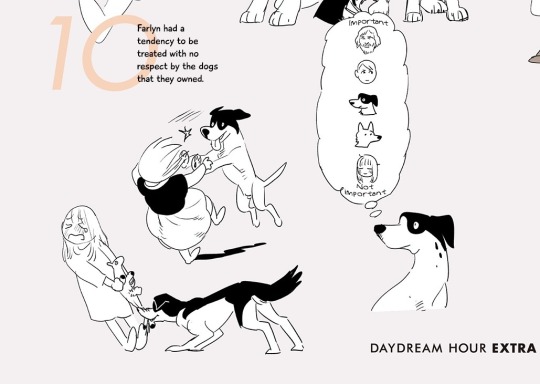
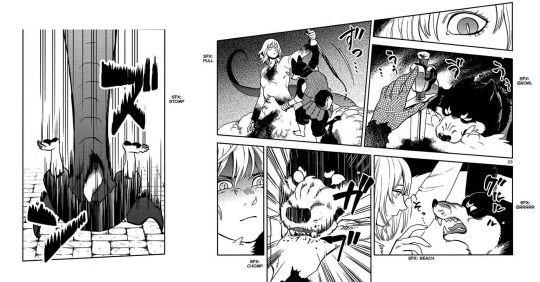
I think she’s on autopilot. I think she’s on autopilot a lot of the time, even before being a chimera, and it’s partly why her will is so weak compared to regular dragons. (Again, read my shorter analysis.) It’s familiar to slip back into the role of following someone around unquestioningly. And that’s what is weaponized when she’s a chimera, that instinct she’s been nursing all her life to unconditionally support, defend and follow someone.
Only now, that someone doesn’t matter in itself, only the symbol of it. She doesn’t mind, either way is fine. Her will is weak after all, because she’s trained it to take as little place as it could.
Falin cares too much
She spends all her time caring for Laios and Marcille alternating that none of her care and emotional energy is left for others, including herself. So she had to get relieved of all of that for a bit, becoming the chimera so she could reset and recenter and remember that she, too, indeed, is there and an important part of her own life.
So you’re probably seeing the duality I’m talking about here, Falin is very self-sacrificial but for specific people in ways that they often don’t recognize or appreciate. She cares but selectively, both in people, putting all her eggs in the same baskets, and in the ways she cares after them. She doesn’t care a lot, but when she does she cares a lot. Falin doesn't have a lot of earthly attachments, but when she does, they're her world.
In canon her arc, especially post-canon, is to grow beyond Marcille and Laios. Her caring for her close loved ones held her back from looking after her own self-fulfillment needs. And this is what I mean when I say she cares too much; she could gain from caring more about the world besides Laios and Marcille, both lands wise and people wise. She cares too little, but her arc centers her flaw around caring too much instead.
Her pitfalls that Kui highlight over the course of the story, while of course her selflessness is appreciated for how she saved Laios and everyone, on a personal level is shown to be self-effacing and damaging. She’s undermined by Marcille, without the courage to voice her thoughts and wants, she would dedicate her whole life to Laios. And I mean, it’s text, in the response to Shuro’s proposal extra no less. And she’s so laser focused on her most loved people that she’s fine with being callous and risking others’ lives, even.
Post-canon, she needs to leave to find herself, away from them.
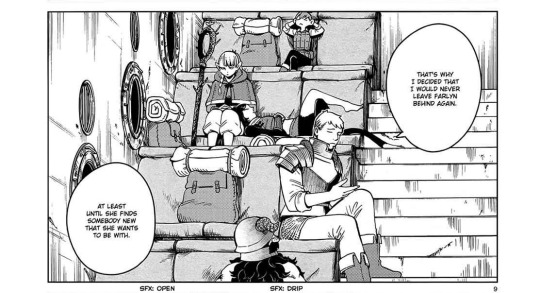
Herself. What if she wants to just be with herself for a while.
And this is me reaching but I feel like, not unlike Izutsumi who learns to feel this sense of never being alone, always having someone on your side what with having two souls, the dragon in her would make her consider herself more. She finds it easier to care after other people after all, and in the purgatory fields sequence she takes care to bring the bit of dragon left with her… Not unlike with Izutsumi, having two souls forces you to think about your identity and figure yourself out.
Besides being this sort of duo now, where if she wants to care after herself she can channel it to that other side of her too… In meta dragons are symbols of greed, and I think the bit of dragon would push her to want more and listen more to her desires, primal and self-serving as they might be. The dragon soul which warped her human body with feathers and draconic features, her image of perfection marred, her weirdness externalized in a way that’s not palatable. But she doesn’t care, about if her appearance is palatable for most people, she hasn’t for a while now, and that’s great.
Notes & nuance
I’m struggling with the structure of this post, making my points organized, concise and strong at once. It’s difficult to make any statement without going "things are generally like this, but there’s this time that this contradicting thing happened too" or "it’s ambiguous enough that you should just follow my interpretation for the time of this analysis" haha, so this is the pit where I put all the stuff that wouldn’t fit well in other places but are interesting for Falin’s character. This section is pretty separate from the main thesis of the post, it’s just more Falin observations.
The post has reached the 30 pics limit so I can’t just pull it up whenever it’s relevant but I really encourage scrolling up to read the stuff I highlighted in her Adventurer’s Bible profile if you haven’t already.
I think with the shy-looking loner type autistic kid archetype, and knowing she didn’t seem to mind others ostracizing her, it’s easy to lose sight of how she was by no means an unemotional child. In all the bits we see of her as a kid she’s bursting with energy and emotions. Canon confirms Laios leaving the village did affect her and make her lonely and she cried a lot, too.
She may not be social in the traditional sense, but she was clingy with her brother, and she also never was all that shy about who she was, wearing her heart on her sleeve.And okay. Okay okay okay. Speaking of appearances. About what I said of her not caring about what people think of her, even seeming defiant with the caravan leader… There’s one istanxe of her caring actually, and it’s about how her face blushes easily. I remembered it as being because Laios’ said it and as I rambled Laios’ words are her world, but actually it’s ambiguous. It’s only Marcille imagining up this scenario where Laios says Falin looks weird because of it, there’s no evidence Laios said or thought that at any point. And on the other hand…
Her Adventurer’s Bible says: "5, Lovely Skin. She isn't particularly careful with it, but Falin's skin is fair and beautiful. Possibly as a result, her cheeks seem to flush easily. Marcille's always saying she's cute, and she secretly has a sizable complex about it."
The phrasing makes me think the complex she has over her blushing might have developed because of Marcille more than Laios. "Marcille's always saying she's cute, and she secretly has a sizable complex about it." It could be related to how Marcille gets swept away and infantilizes her, calling her cute wanting her to wear cute feminine outfits etc. Again this feels like it relates to Falin’s struggle to be seen for who she is and what she wants to be seen as, her struggle to be recognized, having ideals and perspectives pushed onto her. Here Falin is insecure over her blushing implicitly because she doesn’t like being called cute over it, but that’s not how she wants people to see her. She doesn’t want Marcille to always see her as her 10 years old adorable friend. Like if your friend said you had puppy energy, it can be flattering, but it can also make you insecure.
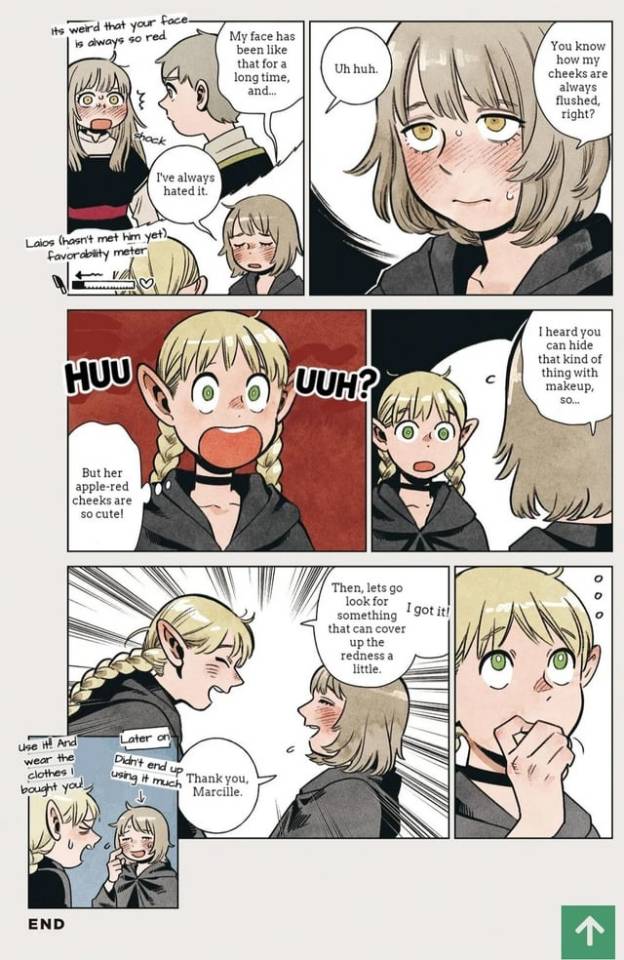
Here’s a link to what I mentioned about her being uncomfortable wearing feminine outfits. It does seem to be more about comfort than the aesthetic perse, to me. Interestingly the shirt & shorts don’t seem like they show much more skin than her beach outfit, so maybe it’s more about the shirt and shorts being tight-fitting. Like the skirts and heels they feel stifling. Again a bit with themes of freedom and not wanting an aesthetic pushed onto her.
So yes just to reiterate, I think this is more about self-affirmation and how her identity and self-image gets shown to others, rather than wishing to hide parts of her body like her blushing etc for people pleasing reasons. Makeup was a way for her to appear how she wants to and feel more confident. It was a way to take control over her own image.
She didn’t keep doing it, the narrator stating the process to be ‘troublesome’. Ultimately she still prioritizes her comfort, and it was a lot of recurring efforts to go through.
And on the topic of appearances… A friend once asked me: "Does she really hide herself or not? I keep thinking about "falin is herself first and foremost" (in her Adventurer’s Bible profile) it’s just so. Hmmmmmmmm... I just keep seeing people say she hides her real self from people when I feel like the issue is more about her charitable traits straying too far into becoming flaws but people around her dont realize that..."
Imo the thing is, I don’t think she hides her identity, but I do think she suppresses her individuality for others’ sakes if that makes sense. In the way that only post-canon does she allows herself to go see what the world is like, but that’s not personality wise it’s needs and wants wise.
And I do feel like that’s the closest interpretation of canon, she says it herself she doesn’t know what she wants because everything she’s done was always about Laios or Marcille, but she doesn’t change her demeanor or personality for others. But she *will*, like, not ask for things she wants directly, like sharing lunches with Marcille at the academy, she suppresses her wants, doesn’t ask things from people and doesn’t hope for more, hope for better. I don’t think we ever see her actively repress her personality, except like what, being more laidback than enthusiastic but I do feel like unlike Laios with her it’s less ‘appearing stoic to fit in more’ and more ‘yeah i’ll just chill until I’m needed or something activates my enthusiasm’.
To which said friend quoted: "to feel like you belong you need to be useful. when you can’t be useful the next best thing is being convenient."
And speaking of passivity… I want to speculate about Shuro’s proposal some more. Shuro and her got along well though we don’t know how much, or how often they hung out, she even saved him from a nightmare.
Why did she take so long answering Shuro’s proposal? Was it an effort to preserve or was she really just that conflicted? Procrastination probably yes, but what is the core motivation of itl Considering she ended up saying no to travel the world instead, I don’t think it was as simple as ‘she wanted to say yes for convenience’. Logically it’s what would have been best, but it’s not what she wanted for herself, but it was and still is hard for her to even know what she wants. Probably, since like she states it was a great offer and she doesn’t think she’ll get proposed to again, it’s that self-effacing tendency that yes it’d be convenient and logical, and that makes her want to say yes even if her spirit isn’t in it, because if it’s convenient then that’s more important than her feelings on the matter.
Man also… Obviously Marcille is very vocal about how she shouldn’t get with Shuro, but imagine how Falin’s whole perspective on marriage must have felt when her only friend ever is a Romantic with a capital R who gushes about idealized romances and grand gestures and True Love and doing things with fully pure feelings all the time.
AND speaking of passivity!!! How much Falin is "there" as the chimera, just how much she’s master of her actions, is left ambiguous and intentionally so imo, but she’s for sure there & influencing the dragon’s action to some degree. Having a dragon’s foot on her in purgatory that keeps her from moving for sure visualizes how it must have been like, but there’s Falin calling out to her brother Laios, there’s the kind attentions towards Thistle that are so Falin-like, and most explicitly there’s the Adventurer’s Bible stating "Even after becoming a chimera, she has a soul that's as kind as ever", which I honestly dislike, a fantranslation puts it as "Even as the chimera, her caring nature remains" and either way to me it feels like confirmation that it’s her giving those berries to Thistle. Now, wether or not she has the mental capacity of a chicken or something closer to human Falin, no clue, there has to at least be some kind of mind bond between monsters and the dungeon lord, compelling or forcing them to go along with orders, or calling her to him in distress like with the fight on the first floor. But yes, it’s interesting to wonder what it is that a Falin, with her kind soul but without her human mind, would willingly do.
On her profile, she’s described as Thistle’s guardian and servant. The power dynamic between the two are very interesting, I already went into how it might have felt like freedom to her while being fake so I’ll reign myself in and just mention it again. She’s still at the heel of someone, only now it’s someone who doesn’t care about her back. Going from being cared for so strongly that it’s suffocating and they would defy death and the world for you, to being devoted to someone who has not one feeling about you besides your utility as a paw . She has all this care to give and to focus onto others and he has none to send back to her and I think that’s part of it. In a way, being left with only her own feelings and a void, without expectations or feelings or ideals pushed onto her, it might have been soothing in itself, and eye opening. But yes the way I think of it, her care for Thistle isn’t unlike the care she gives the ghosts.
Interestingly, the care she extends for the ghosts is sending their soul to a peaceful death, freeing them, of life and any earthly attachment. Take that as you will with the themes of freedom and burden of life and mind, immortality and becoming a warped version of who you were, and such and such.
But going back on the topic of connections and bonds for a bit, I think academy days Falin & Marcille is super interesting bc we’ve never really see Falin form a connection besides with Marcille and even that is kept pretty ambiguous. When was the point that Falin started seeing Marcille as a friend and seeking her out? When was the "I’ll lay down my life for you" point? I’m so fascinated by how she wanted to share lunches with Marcille but never truly asked, only made little "hey want this? I found it isn’t it cool?" gestures of showing things to her… It’s the only way she knows to ask, or maybe it’s the only way she feels comfortable to. In all the scenes of young Falin and Marcille Falin seems comfortable in her friendship with Marcille, but at the same time… I think we see Falin at her most insecure around Marcille, because she really does care about Marcille and what she thinks of her so much, and while Marcille is a bit of an unstoppable force tornado style (affectionate) Falin is something of a doormat. I’d usually say showing her berries was her earnest way to connect and be like "Hey bestie look at this! :]" , but there’s a real possibility that she was self-conscious and holding herself back.
Friendship and Marcille! Involving Laios into this too but, again with the autism thing of not showing you care in ways that others understand, Marcille being very overtly affectionate and clingy was so so soo important… Marcille keeping on hanging out with Falin and caring after her, and being undeterred/unbothered by Falin not always seeming like she cares all that much back in the conventional way, as in Falin acts nonchalant and a bit like she didn’t mind wether she was there with her or not during her outings to the cave dungeon. Caring and being clingy and so affectionate despite that in such a classic Marcille way is soo needed, because so often people will get discouraged by say, their friend not keeping in contact regularly/well, seeming disaffected or as happy-go-lucky as ever even if you haven’t seen each other in a while or when they’re alone, and yes there’s potential for a strong friendship there but someone like Falin won’t be committed enough to reciprocating attention the same way… I hope I’m making sense but yes this angle in particular strongly correlates to autism. And the way Marcille always initiates physical affection, both Toudens being awkward about initiating touch because they don’t know if that’s allowed, if they’re going about the social interaction the right way, if they’re allowed to ask that out of someone…
Another fun observation to make is about the 4 years Falin and Marcille spent apart. Marcille despite being of a long-lived race treated these 4 years of separation with more gravity than Falin did. Falin brushed it off very dismissively to say the least. But then you remember that the amount of time Falin and Laios didn’t see each other after he left the village was 8 years. Double the years, double the time. And that reminder makes Falin’s actions so starkingly understandable. Of course she wouldn’t see 4 years of separation as a long time if 8 years of separation with her beloved brother is her point of comparison. Of course she’d see it as worth it to leave Marcille for 4 years if it meant ending those 8 years instead, especially if she was worried about him (the reason why she followed him into his caravan job).
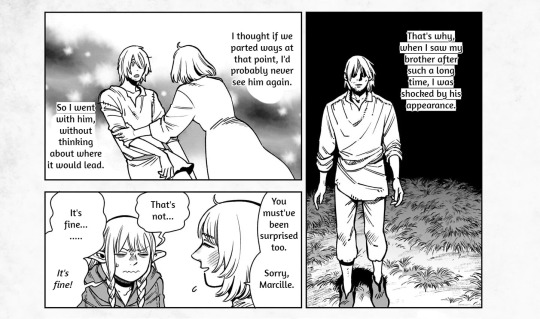
A friend always says that while Falin is the center of Marcille’s world, Laios’ is at the center of Falin’s, and I tend to agree.
It’s fun to think of how her career dreams had always been shaped by Laios, even when they were kids. Of course there’s how traveling the world began as a dream they talked about and shared, but there’s how he reassures her by listing cool jobs she could do like traveling exorcist, etc. And then of course, she gave up on her magic academy and career path to follow him and do odd jobs, etc etc.
I should go into the violence of Faligon more tbh, because I think there’s an interesting parallel to how she has no problem wacking things with a mace, wether a ghost when she was a kid or a walking mushroom as an adult. Something that often surprises fans when they remember, I don’t really want to get into the whole "
Falin hates violence and hates seeing people in pain to an intense degree. ‘If you die do it somewhere where I can’t see’ style’ interpretation, it has some weight but on the whole I don’t vibe with the theory she has a particular aversion to violence, she seems to be fine resorting to it as much as any other adventurer as long as it isn’t needlessly against ghosts.
And Falin’s sudden mace hits are fun to me too because it’s not her becoming a berserker when the need arises as much as her becoming active because something she cares about is threatened, and that brings her out of her passivity from 99% of the rest of the time. Thistle included. Falin always could be violent, she just dislikes senseless carnage. The Shuro party vs chimera fight is a bit ambiguous on it, because you can argue she only attached after being provoked, presumably offscreen as well while the ninjas went off to fight the harpies.
Falin becomes the most active when she needs to protect someone, she has no qualms doing whatever’s needed for that, wether it be leaving the academy & Marcille without notice no matter the consequences or what her parents think, or teleporting the party, etc.
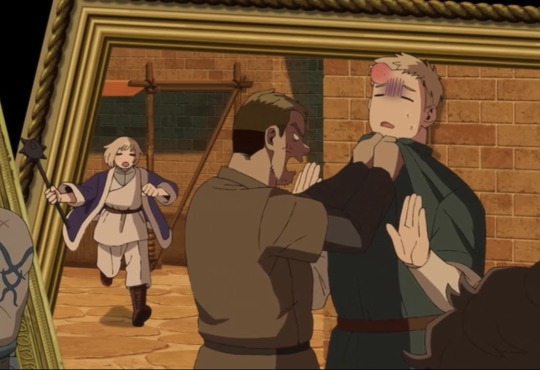
I’m working on a post specifically pointing out all the differences between Falin and Laios, but yes I think both of them selfishly desire freedom in different yet similar ways. Falin’s dark secret is "Ethics and risks are optional if it means I can protect those I love" like the teleportation, and Laios’ is "Ethics and risks are optional if I can be free of all this bullshit" aka humanity aka his wish with the winged lion.
Conclusion
Flighted birds have hollow bones. With freedom and wings there comes risks and sacrifices.
Tldr:
Falin doesn’t care all that much, she’s very go with the flow. For example if someone hates her she doesn’t really care because that’d require her caring about what they think of her in the first place, and she only cares about her loved ones. She smiles, but it’s more a state of being rather than out of active goodness: she’s canonically very genuinely kind, but it’s more out of a general want for pleasantness than active care itself. She’s passive, and softspoken because that’s just how she seems, but she has no problem hopping into bushes or getting heated if something calls to her enthusiasm or calls for action and a hit of the ol’ mace. Her loved ones needing tending or protective is what makes her go from passive to active. That familiar autopilot mode of making someone the center of her world and following their every move is what made her so easy to be controlled as the chimera, even ferociously defending him with her life.
Faligon is most interesting to me with the theme of freedom. She’s shackled to Thistle and out of her mind, but there’s also a sense of empowerment and freedom from expectations and society.
She spends all her time caring for Laios and Marcille alternating that none of her care and emotional energy is left for others, including herself. So she had to get relieved of all of that for a bit, becoming the chimera so she could reset and recenter and remember that she, too, indeed, is there and an important part of her own life.
There’s a way of caring after others that can be selfish, not unlike Marcille being overly coddling and not listening to Falin. In Falin’s case, I think it was so selfless that it ended up looping back around to erasing her sense of self. In losing sight of herself, that devotion becoming neither quite selfish or selfless but a fact of life and a state of nature, muddled by its lack of direction.
She’s sooo used to never being able to ask things out of others, you get the crumbs of affection and approval that others offer to you unprompted and that’s it don’t hope for more don’t ask for more. (Also reflected in how she follows her loved ones around without complain or personal opinions and how she’s not willing to rock the boat and affirm herself in her relationships like with Marcille during canon)
Falin cares so much, so much and so laser focused on her few loved ones that it blinds her and she loses sight of everything else, she ends up neglecting herself and the rest of the world. As Kui puts it, Falin is herself first and foremost. She just had to remember the importance of that.
-
I see her as an enneagram 9, which can be surprisingly accurate and fun to research through the lense of Falin. Excerpt below from this book, but like my god, good way to put it
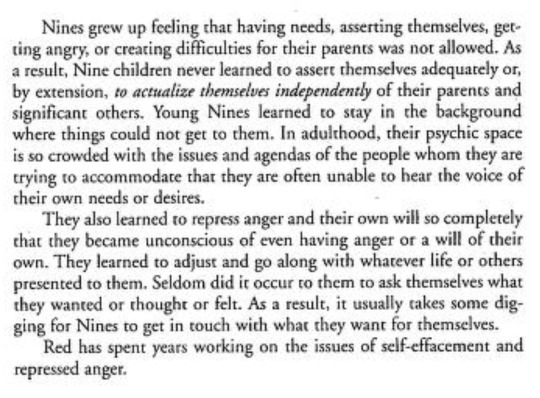
That’s it, ty for reading. Even if it’s a bit of a mess, hopefully you’ll have gained a thing or two from it. Falin is a character hard to pin down, but it is very gratifying when you find the way that the puzzle pieces fit together right for your own understanding of the story.
Fantranslation of the shuro proposal comic by @/thatsmimi here.
Here’s my spotify playlist for her if you’d like
Sometimes love is about letting go, a lesson a lot of the cast needed to learn. Self-love’s important too, and just like with diets we need a healthy balance.
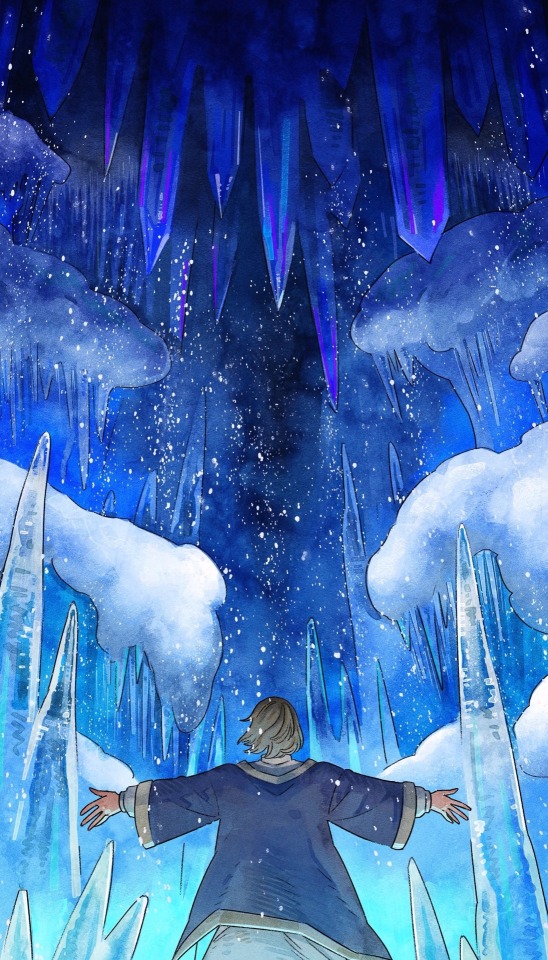
#I find it hard to express myself right on the topic of Falin. Both because the issue is pretty vibe based and because we don’t#get that many moments with her. So there’s ambiguous scenes up to interpretation addressing a layered topic and like. Save me. Save me#As always falling down the rabbithole of starting an analysis about a specific facet and then needing to explain everything else around it#I’m doomed. I’m getting lost in the sauce.#dungeon meshi#delicious in dungeon#falin touden#analysis#character analysis#meta#autistic reading#aroace reading as well. Sort of. It’s mentioned#The aroace autistic guilt of not caring back in the way/with the intensity you’re expected to#As always this is just my interpretation blablabla#Spoilers#dungeon meshi manga spoilers#She loves like a dog aka unconditionally and happy with eating scraps of affection and attention off the floor#Laios touden#he’s here too bc they are an unit#If you’re not capitalizing on the uncanny vibe autistic effect for Falin’s character u are missing an opportunity imo#Fairy’s child is written all over her. Her cryptic-ness is the point so why am I surprised she’s hard to fully pin down#Even with the graveyard scene it was Falin following Laios… Sob. Laios could feel responsible her powers were found out#I’d like to rework this at some point if i get better at structuring. I’m not satisfied by the level of clarity#Will 90% for sure edit stuff in if i find more to say.#Fumi rambles#Crazy style#I give a TLDR at the end if you’d prefer. It doesn’t have the like evidence/explanations alongside but it makes the main points i think
739 notes
·
View notes
Text
I wonder if the Winged Lion ate Marcille's hair (desires) in part to keep her dependent on him & more easily controlled.
I had already noticed that he has a tendency to frame her power in ways that keep her reliant on him. It's a some classic manipulation bullshit - he appears helpful, but he is constantly pushing her towards isolation.
See, for example: offering at first to give her a full view of the dungeon to help her find Laios and the others, knowing its painful for her -

And then offering using monsters to search instead, which keeps her less aware of what's actually happening

(This post by @mmikmmik has some GREAT insights into this particular moment as well, and is a large part of what has me thinking about the ways the Winged Lion manipulates Marcille in general.)
Or there's also the way that he pushes HER to be the one to attack the Canaries, making her more explicitly their enemy and more directly responsible for their injuries...
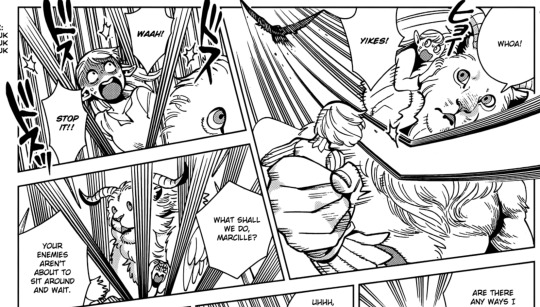
Even though moments later he's perfectly happy to deal with Mithrun himself, without Marcille's guidance (he even hides the act from her).
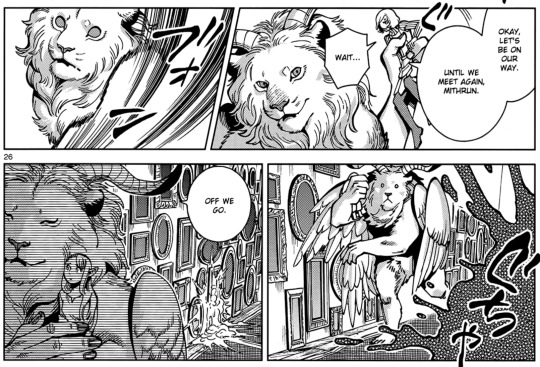
All of these things keep her isolated, all of these things keep him in control.
But if the Winged Lion wants as much control over Marcille as possible, and wants her only to act through him and his powers, you know what else he probably wants to suppress? Her magic.
And what helps her keep in touch with her magic?
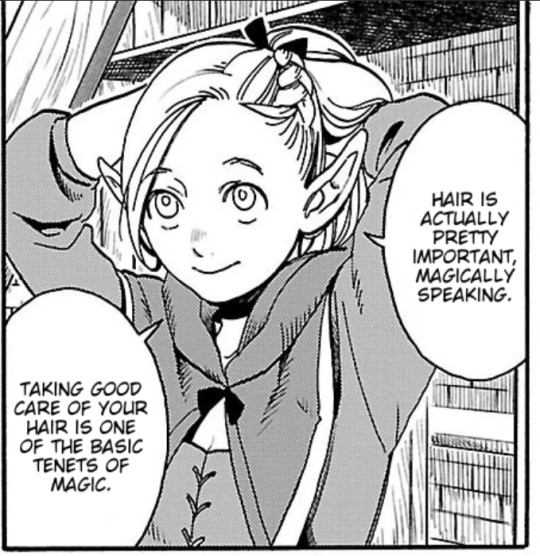
Her hair.
Think about it. Thistle was such a thorn in the Lion's side in part because he was able to seal the Lion in those books and act independently. The last thing the Winged Lion wants is another mage getting out from under his thumb.
Plus, we already know the Lion can be tactical with how he consumes desires. We know because we just saw him eat Thistle’s desire to resist, only a few chapters before turning his charms on Marcille.


So, if he wants to make use of Marcille, wants to keep her under his control, and doesn’t want to show his hand - he can use a similar technique.
Something as small as eating her desire to take care of her hair wouldn’t be noticed right away, but it would keep her disconnected from herself. It would be another small step in undermining her ability to act - to keep her friends safe, to achieve her goals, to fix things - without him. To make her feel like the only way out was to obey.
#dungeon meshi#delicious in dungeon#marcille donato#dunmeshi analysis#dungeon meshi spoilers#(mmikmmik I hope you don't mind the @ I just loved your post and wanted to give it a shout-out)
2K notes
·
View notes
Text
Twilight's Habit of Observing Yor and Anya
I just noticed how often Twilight observes these two interacting with each other, the anime is inclined of highlighting this since most of these are not in the manga and I love them for that.
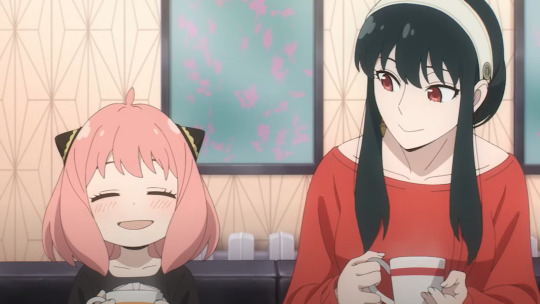
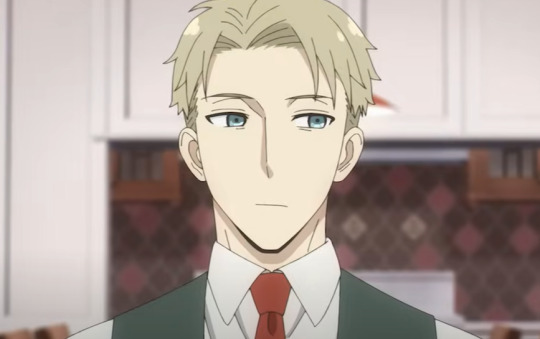
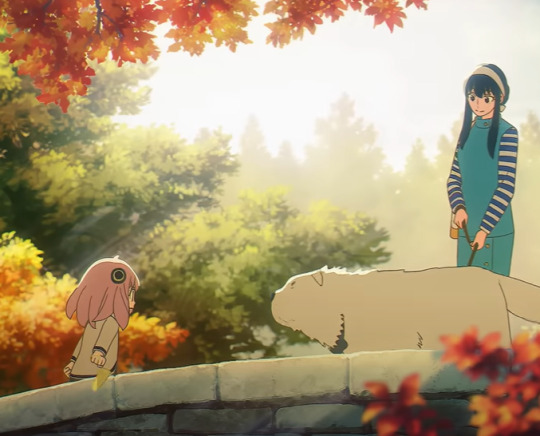
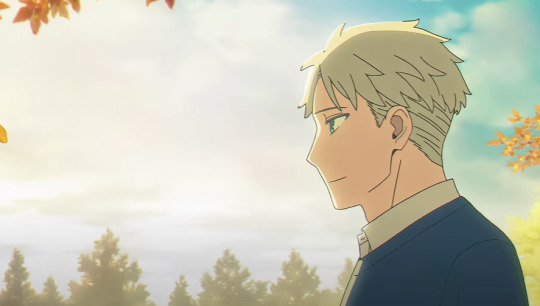
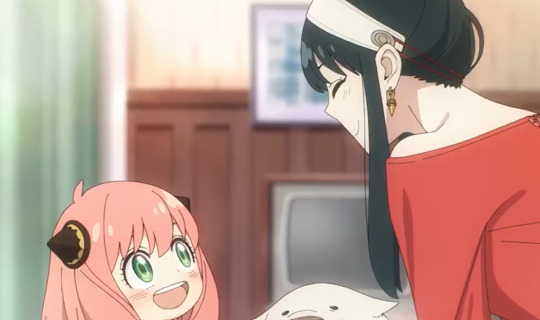
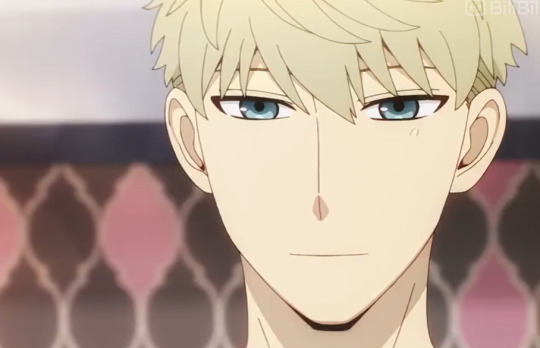
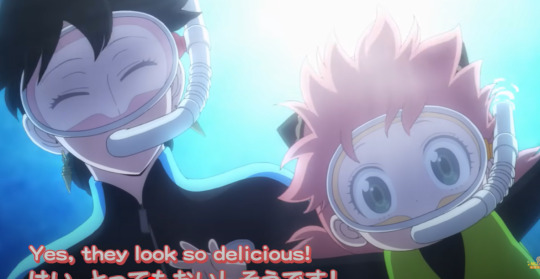
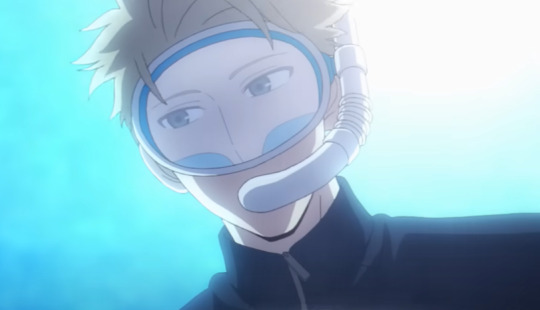
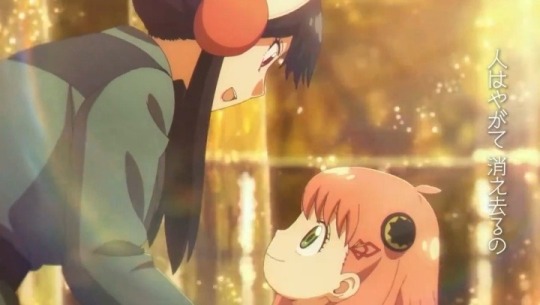
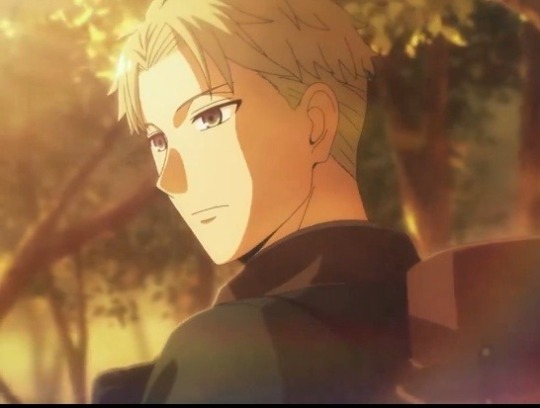
Look at how fond his face is when he's looking at Yor and Anya's genuine affection for each other. I think he can saw glimpses of him and his mom through them.
Yor and Anya share a true mother-daughter bond, even though they don't share the same blood. In his world as a spy, where deception and pretenses rule, Yor and Anya's genuine bond is a breath of fresh air for him. It was something that is very much real and it's something that is under his care regardless he is Twilight, Loid Forger or his true self. He was the one who united their family and I think it makes him wonder how an epitome of deception like himself can build something as authentic and genuine as this.
That face he makes, the longing warm stare directed at them. I can't explain it but his eyes are really different when he's looking at them. It's soft. Yep, this man is already into deep.
Also, it makes me wonder, judging at how often he observes these two, how could he not tell something was definitely weird about them? At this rate he must've been constantly and intentionally ignoring those😂
More Yor and Anya interacting with each other in Loid's view:
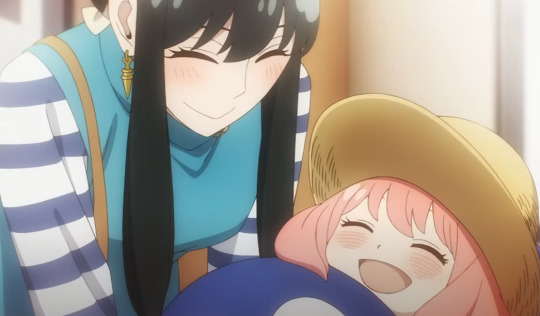
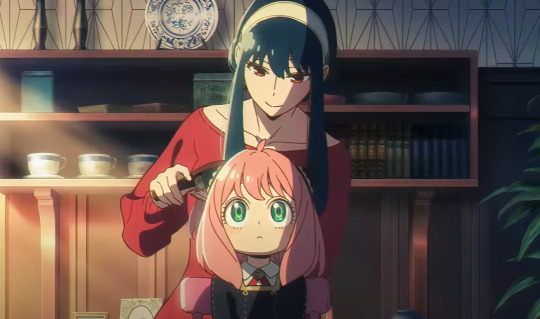
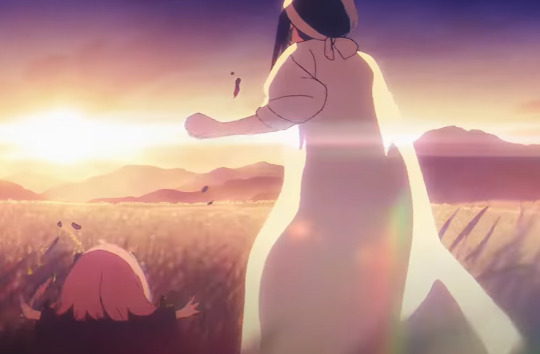
They were always so bright in his view. I think he associates the both of them as his source of light. That's just so sweet and wholesome😭❤️
#spy x family#spy x family manga#loid forger#spy x family anime#twilight#sxf anime#sxf manga#yor forger#anya forger#twiyor#forger family#spyxfamily#the forgers#sxf analysis#spy x family analysis#sxf#I love anime for always showing this habit of Loid#This man is so soft for his family#There's no way he's not attached to them in any way#Of course he wouldn't admit#Can't wait for him to finally completely accept that he could also be as genuine as his wife and daughter#Yor being with Anya is LOVE
2K notes
·
View notes
Text
Being Big Red
Rise Ramblings #312
In “What Was Meant To Be” and “What They Became,” I discuss how the turtles were created by Draxum to be weapons and then how the boys were embraced by Splinter to be a part of the Hamato clan.
I also discussed how Splinter viewed television as a window into his former life. He used television as a means to drown himself in a never-ending cycle of reminiscing the past and mourning his former self.
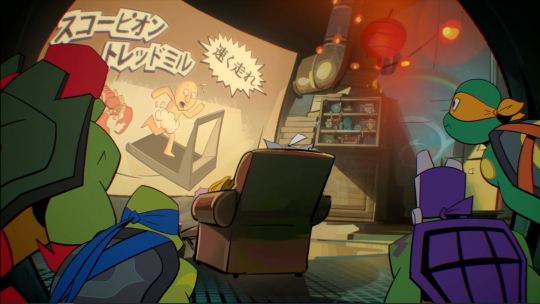
Splinter’s crushing depression, though never voiced, impacted the turtles’ emotional growth and development. As a result, all four brothers had to cope with their father’s lack of attention and his expectations for their lives in their own way…
However, I believe that no one had more pressure placed on them than Raphael Hamato.

Raphael is naturally easy-going, sweet, fun-loving, and supportive. But, as the oldest/biggest turtle, he became the impromptu leader of their little team by default. Consequently, he takes on several different roles for the sake and well-being of his family.
Their day-to-day training regimen is directed completely by him.
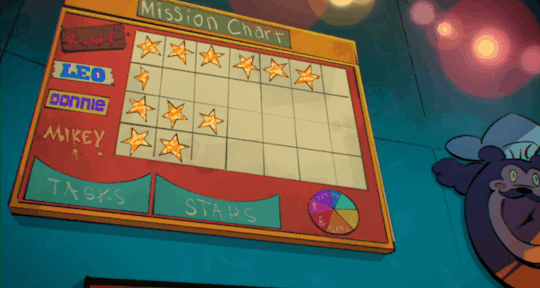
He is the boys' moral compass and who they go to for guidance.
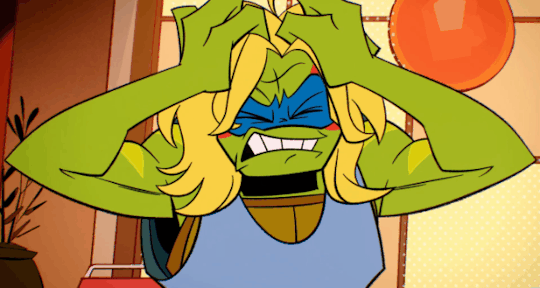
He's the team’s backbone, support, and backup, which often cumulates in him acting as a physical shield when things get rough.
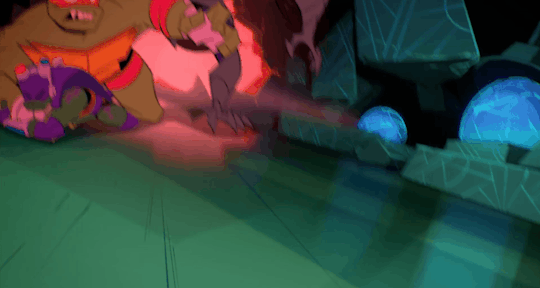
And, most significantly, Raph is the leader even when he himself wants nothing more than to crumble to pieces.

Raph is so physically imposing, strong-willed, and devastatingly kind-hearted that it’s easy to expect these roles from him.
But, Raph is also just a child.
In reality, these roles should never have been Raph’s to bear…
Parentification is a process in which a child or adolescent is forced to act as a parent to their siblings (or to their actual parent) through providing emotional support (Emotional Parentification) or physical support (Instrumental Parentification) in order to maintain the household.
I believe that Raphael was subjected to both, but was especially subjected to the former.
All of the roles described above are the roles of a supportive parent to their children (or Sensei to their students.) To verify this claim, you needn’t look further than the roles that Splinter encompassed in any other iteration.
With Raph, none of this responsibility comes naturally. He has to work hard to live up to the pressures and expectations placed onto him, resulting in a dissonance between his responsibilities and his true nature.
I believe that you can see the evidence of this dissonance in his chosen form of dress.
Have you noticed that when Raph casually dresses himself, he mostly wears white?



Even Donnie picked up on this trend when he chose outfits for his brother in "The Clothes Don't Make The Turtle."
(See "The Fashionista" for a full breakdown on Donnie's impeccable fashion sense.✨)
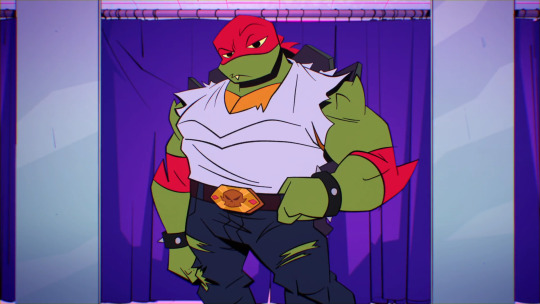

Yet, when Raphael is filling a role, or dressing to impress others, Red is his automatic go-to.
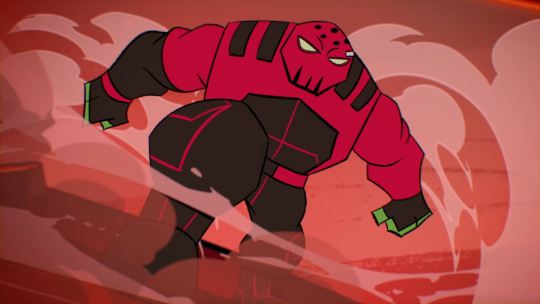
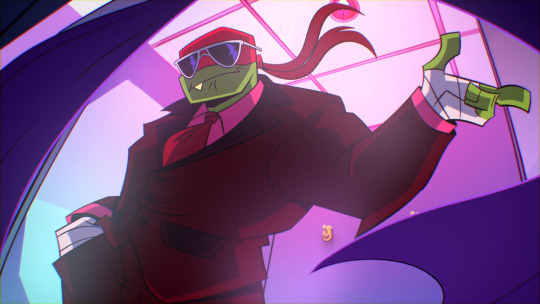
It’s almost as if the title of “The Red One” was not one that he chose, but one that was merely placed onto him.
But I digress...
Raph is able to be a pseudo-parent to his brothers and serves to fill in the gaps that their actual father could not fill. However, with no outlet for his own insecurities, all of that pressure had no relief.
And, if you understand chemistry, pressure, with no release, creates an explosion.

“Acting out” is an unhealthy defense mechanism in which one expresses their unacceptable feelings through physical actions.
In this case, the "unacceptable feeling" is disappointment, not at his brothers, or with his father, or with any external force, but with himself. And with no outlet and with no one to turn to for support, that disappointment turns into red hot anger.
He’s so disappointed with himself, in fact, that he reaches his breaking point.
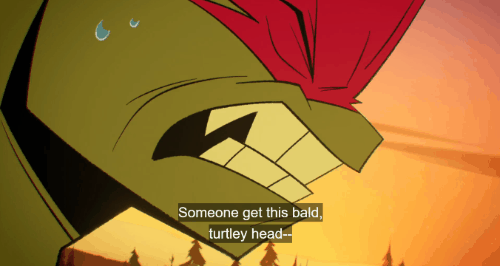
Then finally, finally, he opens up.
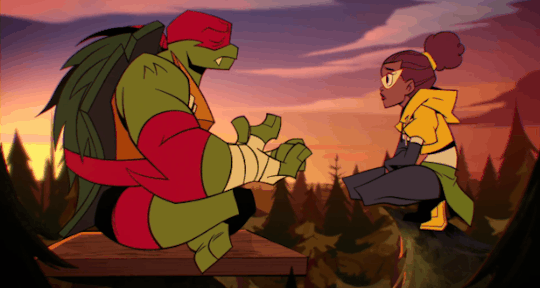
And at long last, he gets the support he so desperately needed.
Thus, he is able to ultimately let it all go...

It's so lovely to see that his family does not disappoint.
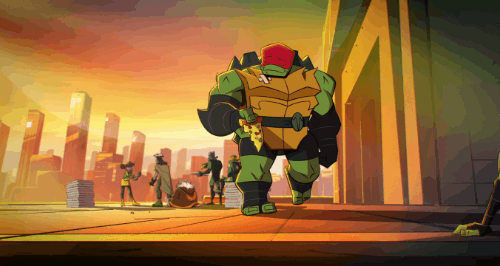
○○○○
Next | Being Baby Blue • Being Purple ○ Part One • Being Purple ○ Part Two • Orange, Baby!
Finale | Being Hamato Yoshi
#he is the best of boys#he tries so hard#and I love him for that#research resources provided upon request#starkiss ramblings#rise analysis#rottmnt analysis#character analysis#Raphael Ramblings#rise raph#rise raphael#raphael#rottmnt raphael#raphael hamato#rottmnt#tmnt#teenage mutant ninja turtles#rise of the teenage mutant ninja turtles#rise of the tmnt#tmnt2018#tmnt 2k18#tmnt 2018#save rottmnt#unpause rottmnt#unpause rise of the tmnt#save rise of the tmnt#save rise of the teenage mutant ninja turtles
1K notes
·
View notes
Text
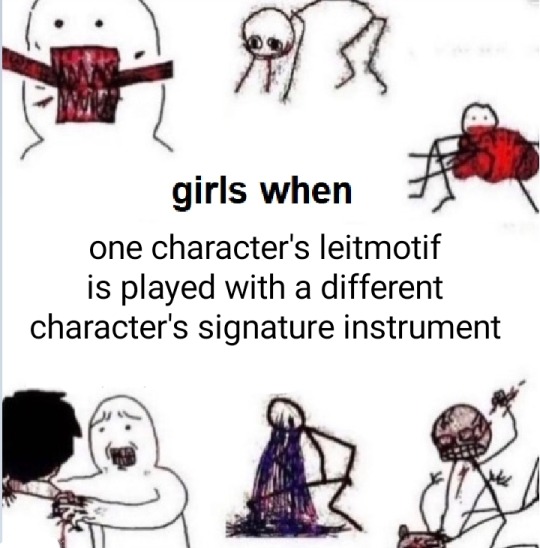
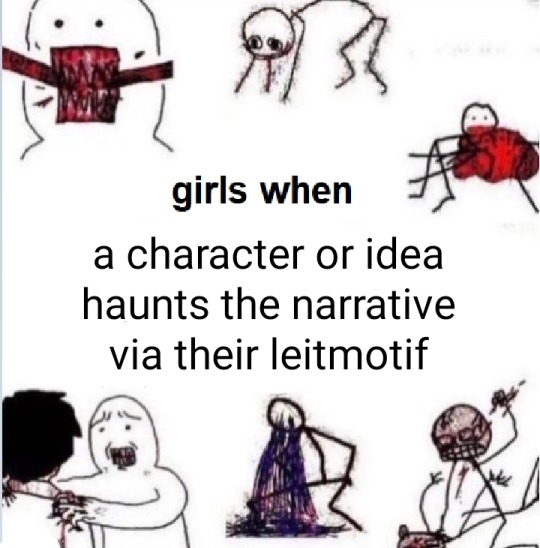

Thinking about film scores & concept albums & auditory storytelling
#grrr argh bite#it's so!!!!!#i love you film & tv composers you're my world#film scores#songwriting#narratives#music#film#leitmotifs#media analysis#themes#motifs#she speaks!#id in alt text#15k
19K notes
·
View notes
Text
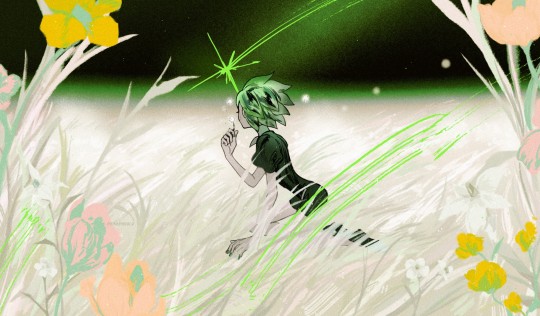
a lifetime of happiness
**hnk ch 108 spoilers**
Can't believe it's already been a month since Houseki no Kuni ended... It's been a ride leading up to the finale but I finished the series with tears welling up in my eyes, and a sense of peace. 😭
The ending was hopeful and meaningful— an unexpectedly lovely conclusion for Phos! 🤧 I love the visual metaphor of Phos and the gems being reborn into "The Pure Land", or known as, The Land of the Lustrous, a purified paradise free of materialism and earthly temptations. These delicate gem flowers holding tiny, unique universes, will be eternally brightened by Phos' radiant existence. With the possibility of other universes, I hope that Phos and the others will meet again and lead more fulfilling lives together!! 🛌💭
The way my jaw dropped realizing Ichikawa ended the last chapter on number 108, the Buddhist symbol of overcoming worldly desires and embracing new beginnings to attain nirvana. SO good...😦 The parallel between big brother and Phos, both on self-destructive, morally ambiguous paths for their loved ones/ideals, was a compelling twist. I love them both... 😢 As Aechmea and Adamant hoped, big brother passed on knowing he helped Phos find happiness. 😭 Wailing...
This series has profoundly impacted me more than I imagined, shaping my perspectives on my own values and the world. Despite it coming to an end, we will always stay connected across time and space, just like Phos!!! 🥺🤍
Thank you, Haruko Ichikawa, for creating such a memorable piece of work, and to everyone who has liked my hnk art and commentaries throughout the years! I'll continue loving and drawing the series for as long as I can. 🙇
#housekinokuni#land of the lustrous#hnk#it was the best possible ending for phos and i love how beautifully depicted the closing chapter was T_T#treasuring it in my heart forever!!!#hnk 108#hnk spoilers#thanks to anyone who follows my other platforms and rereads the same caption lol!#i'd like to eventually compile an more complex analysis now that the series is finished!! maybe after i reread everything <:)#pemprika
667 notes
·
View notes